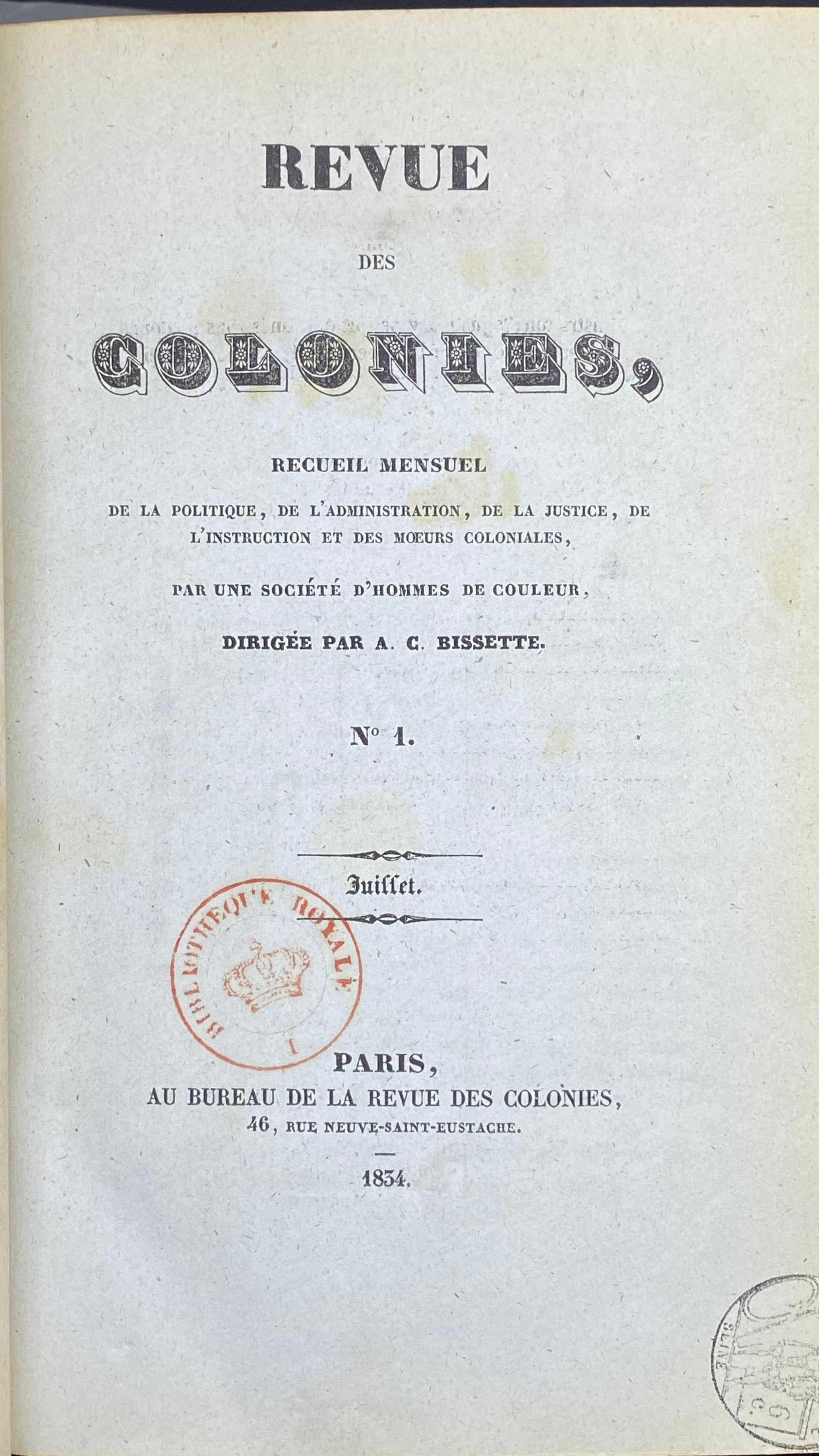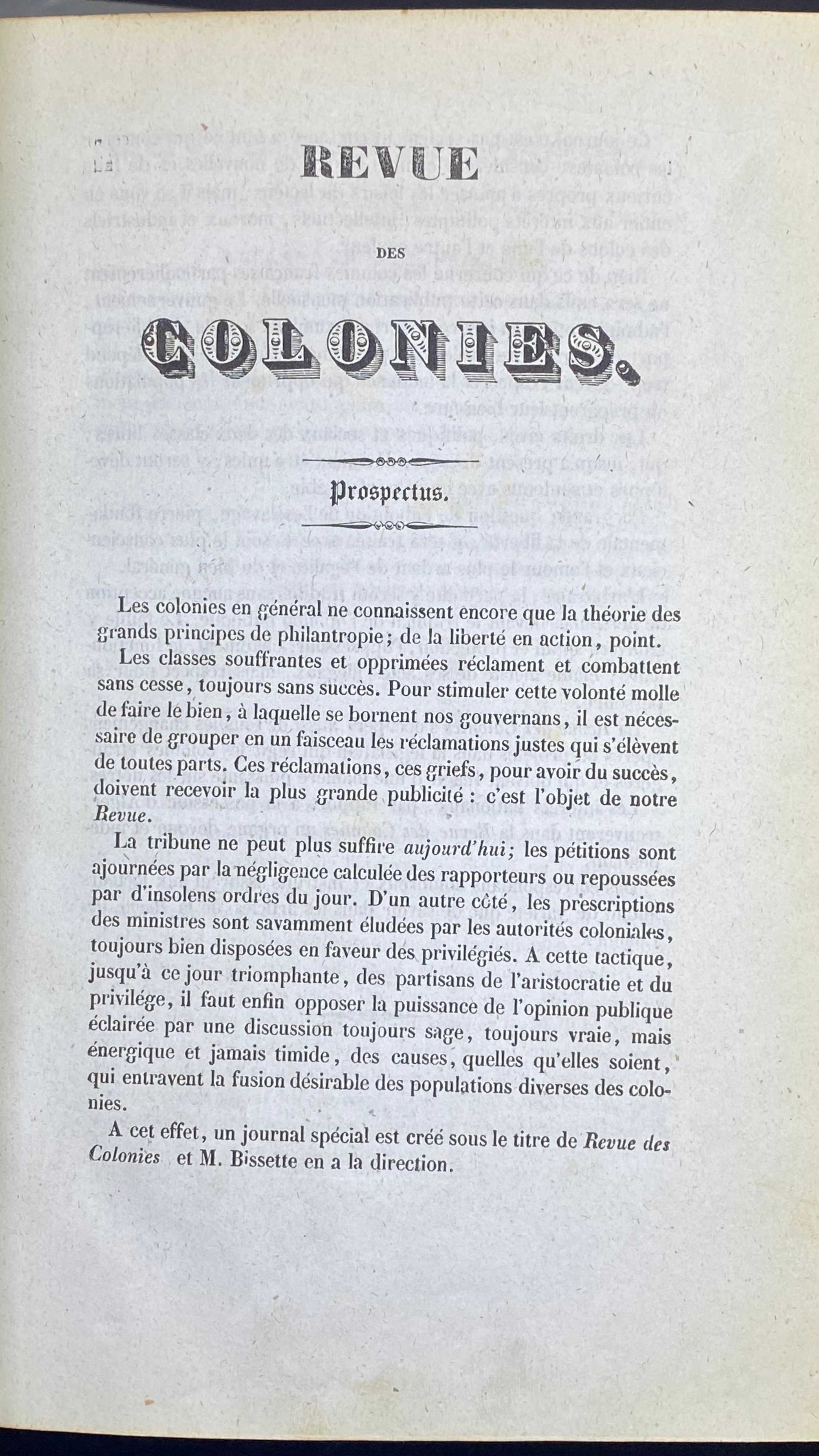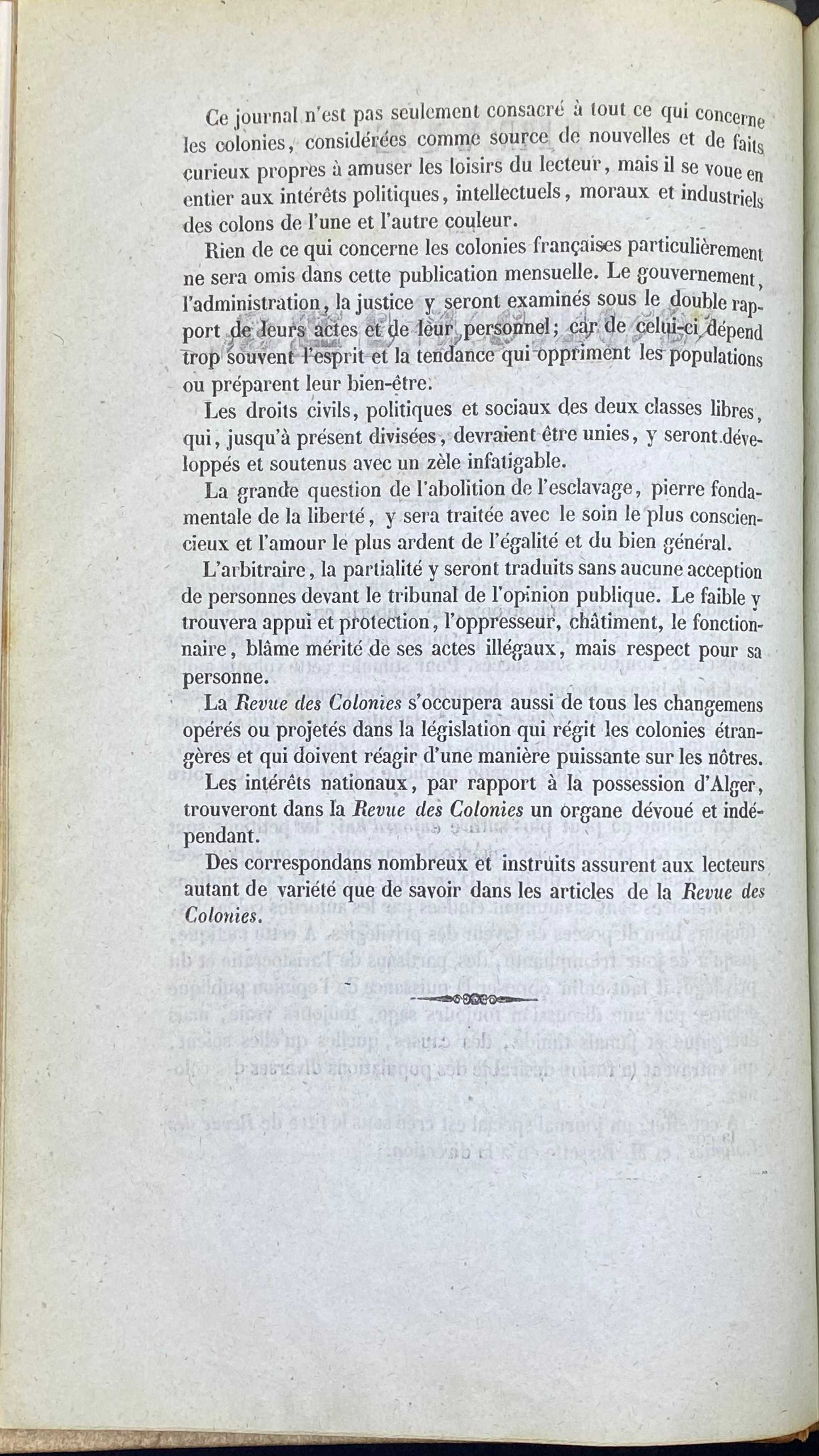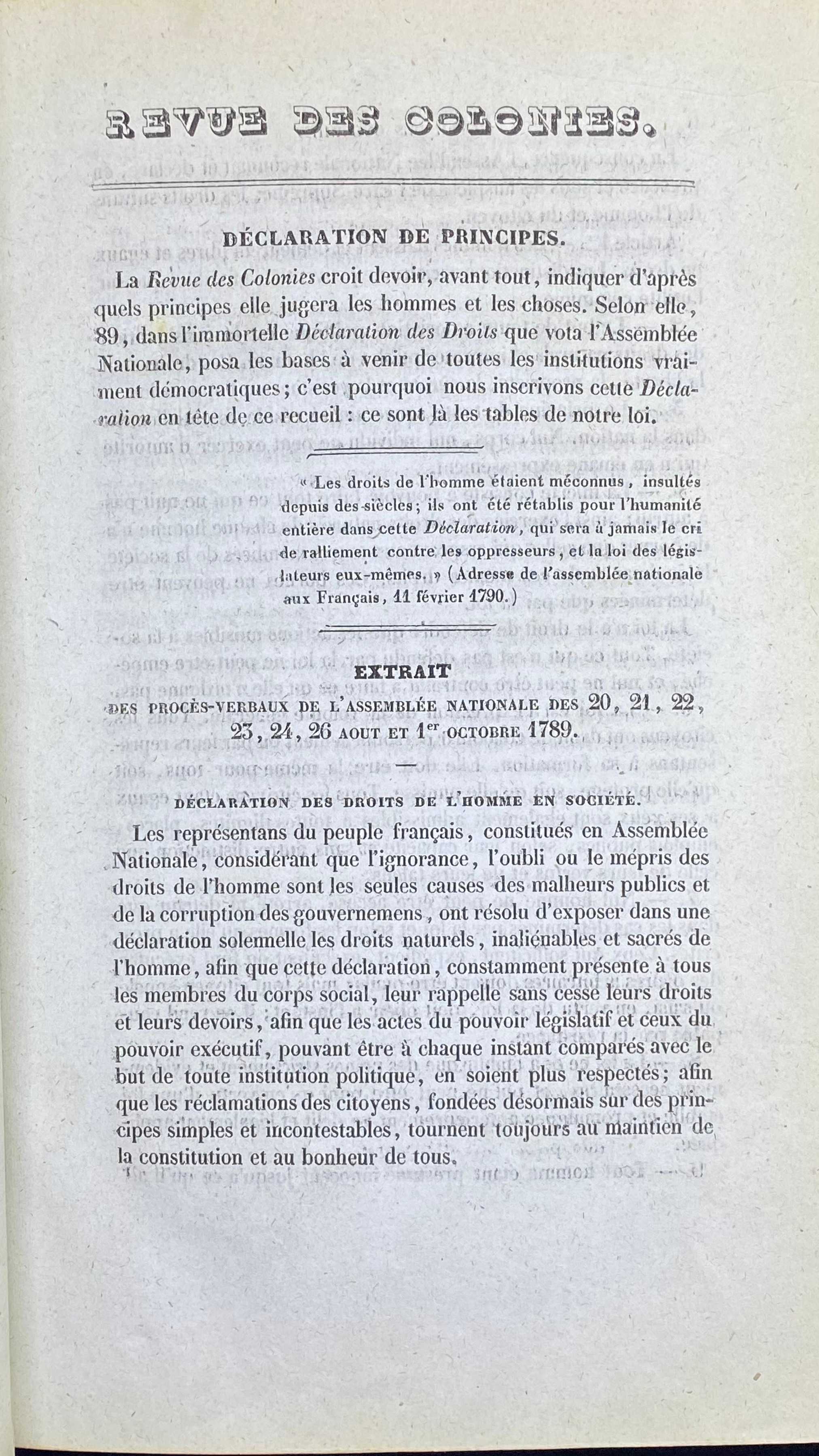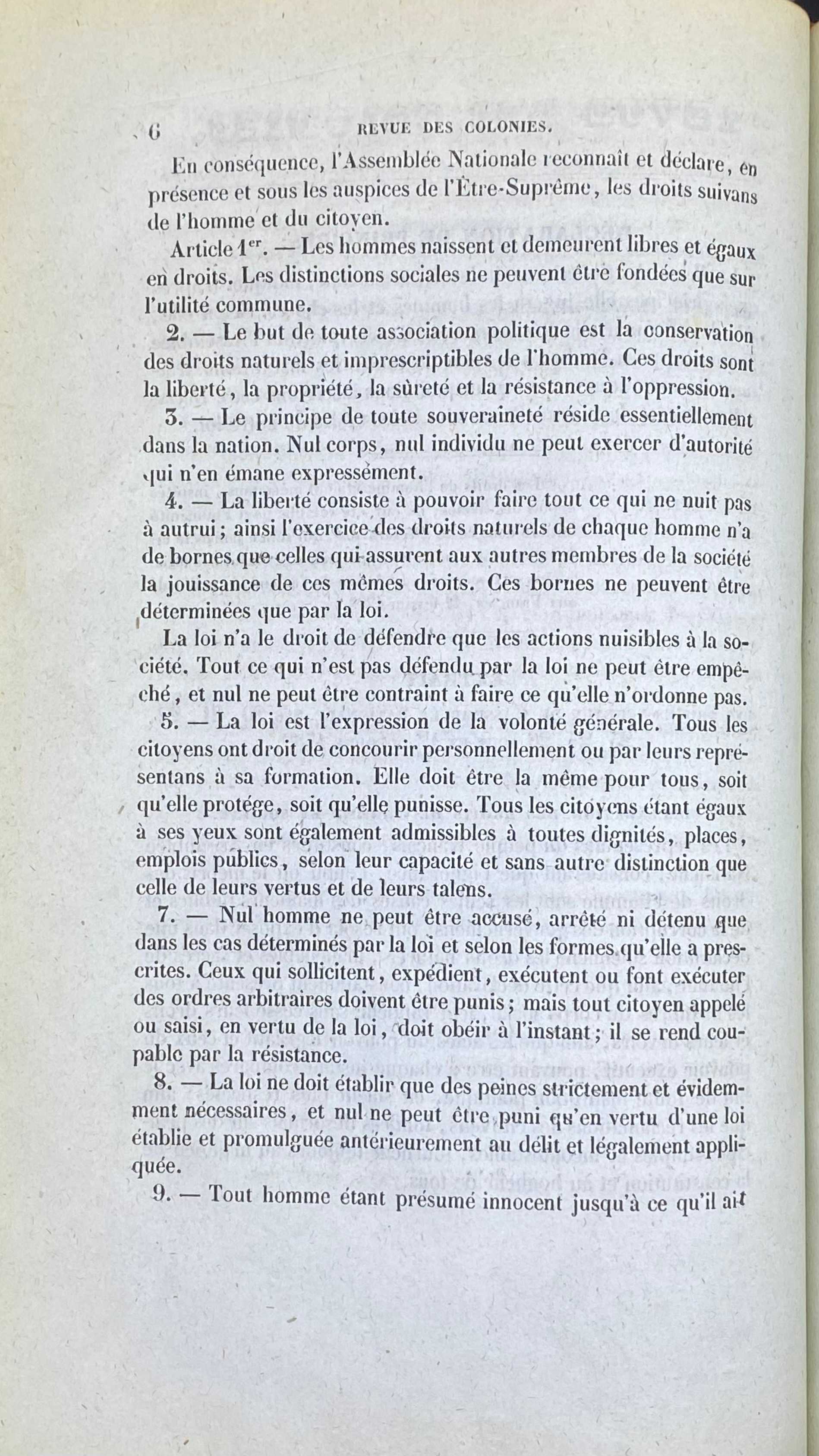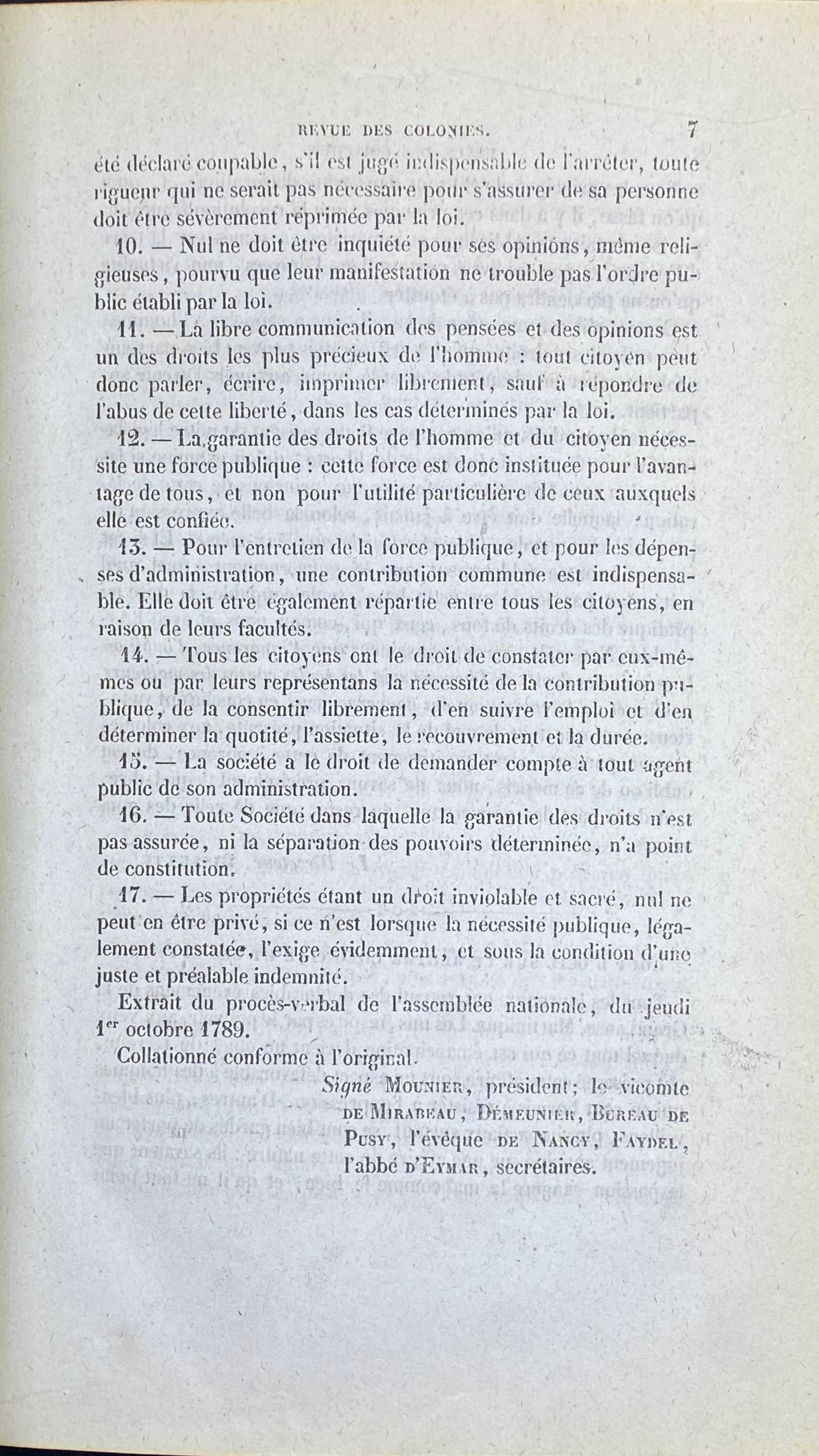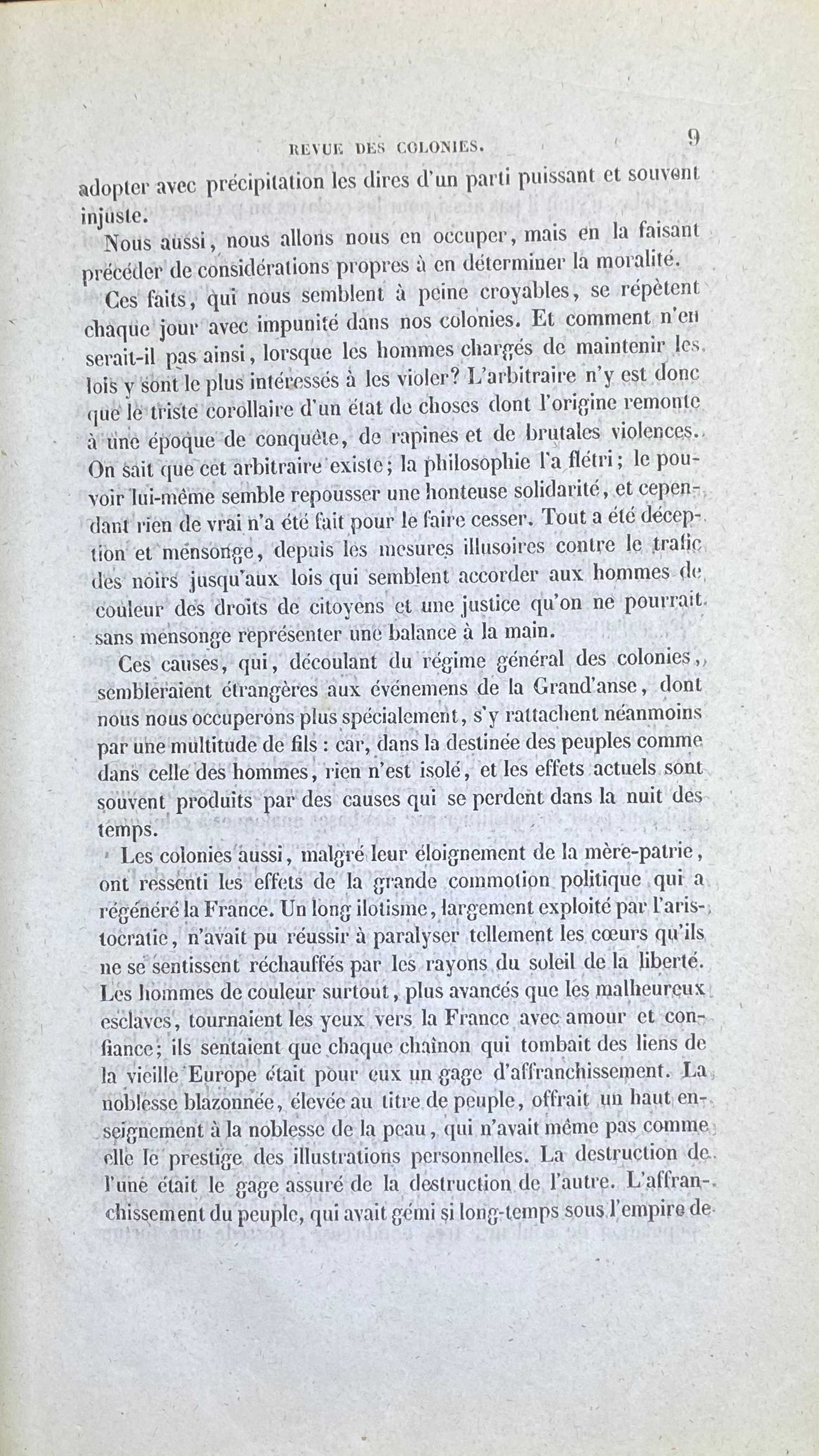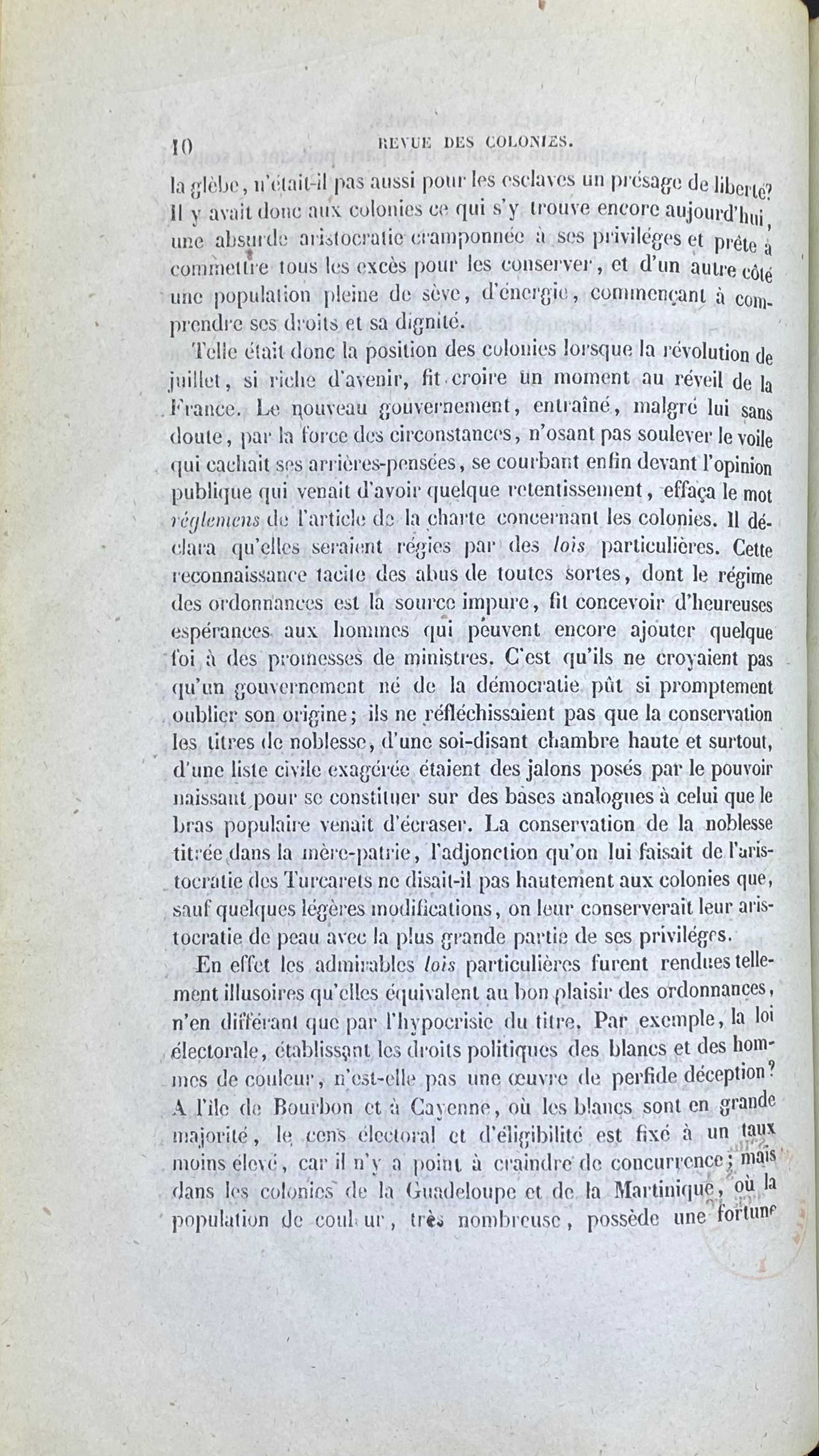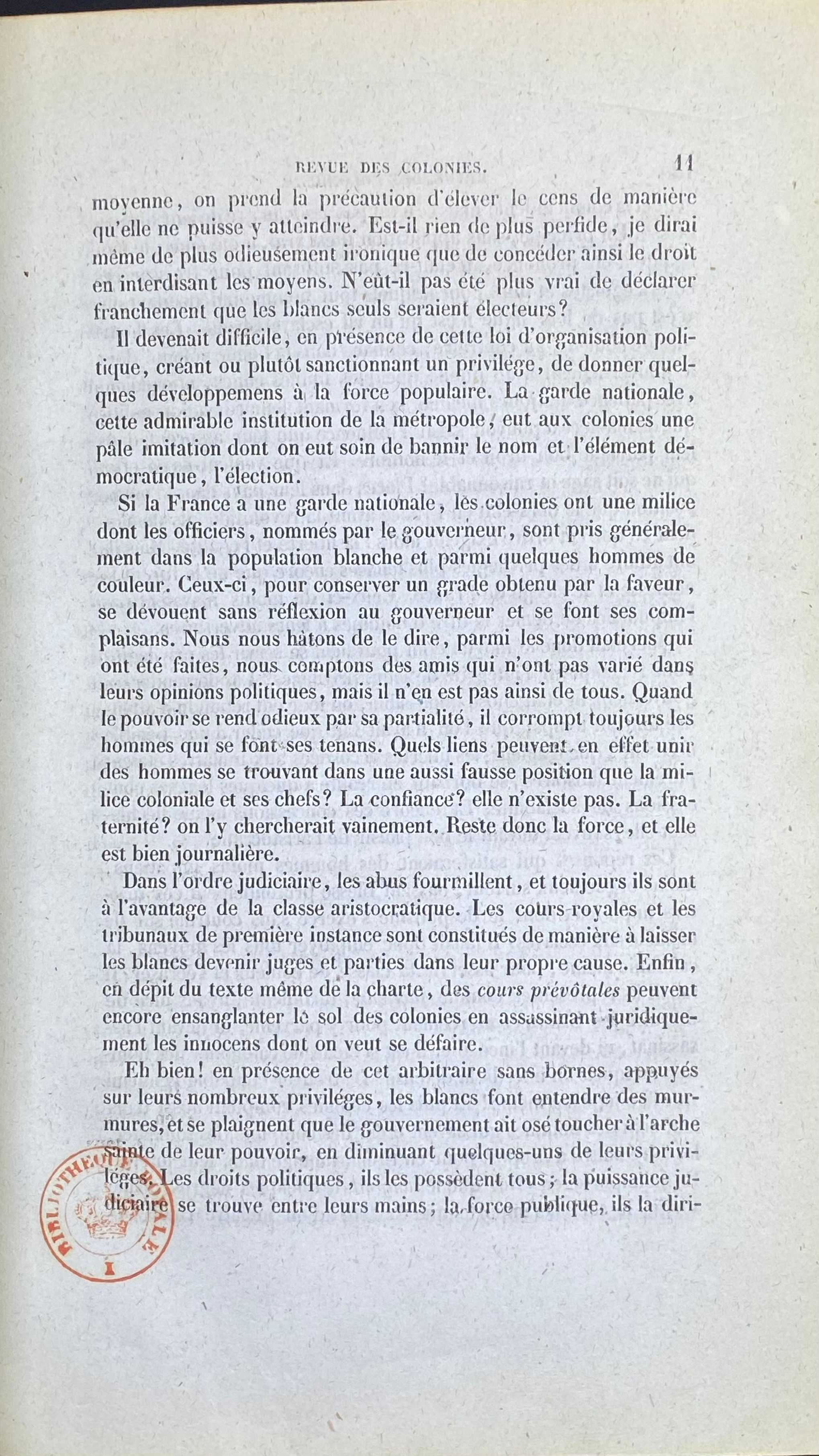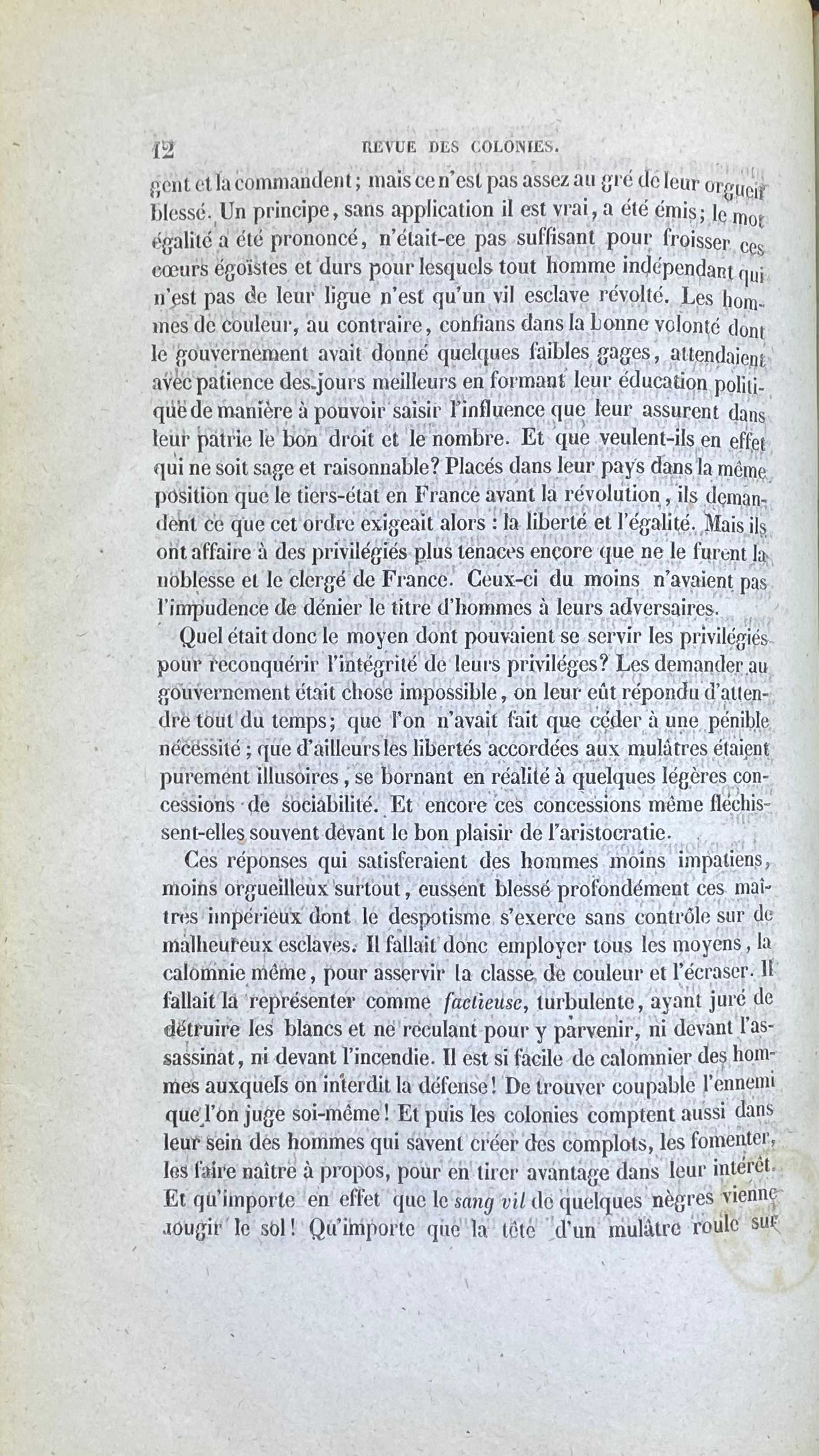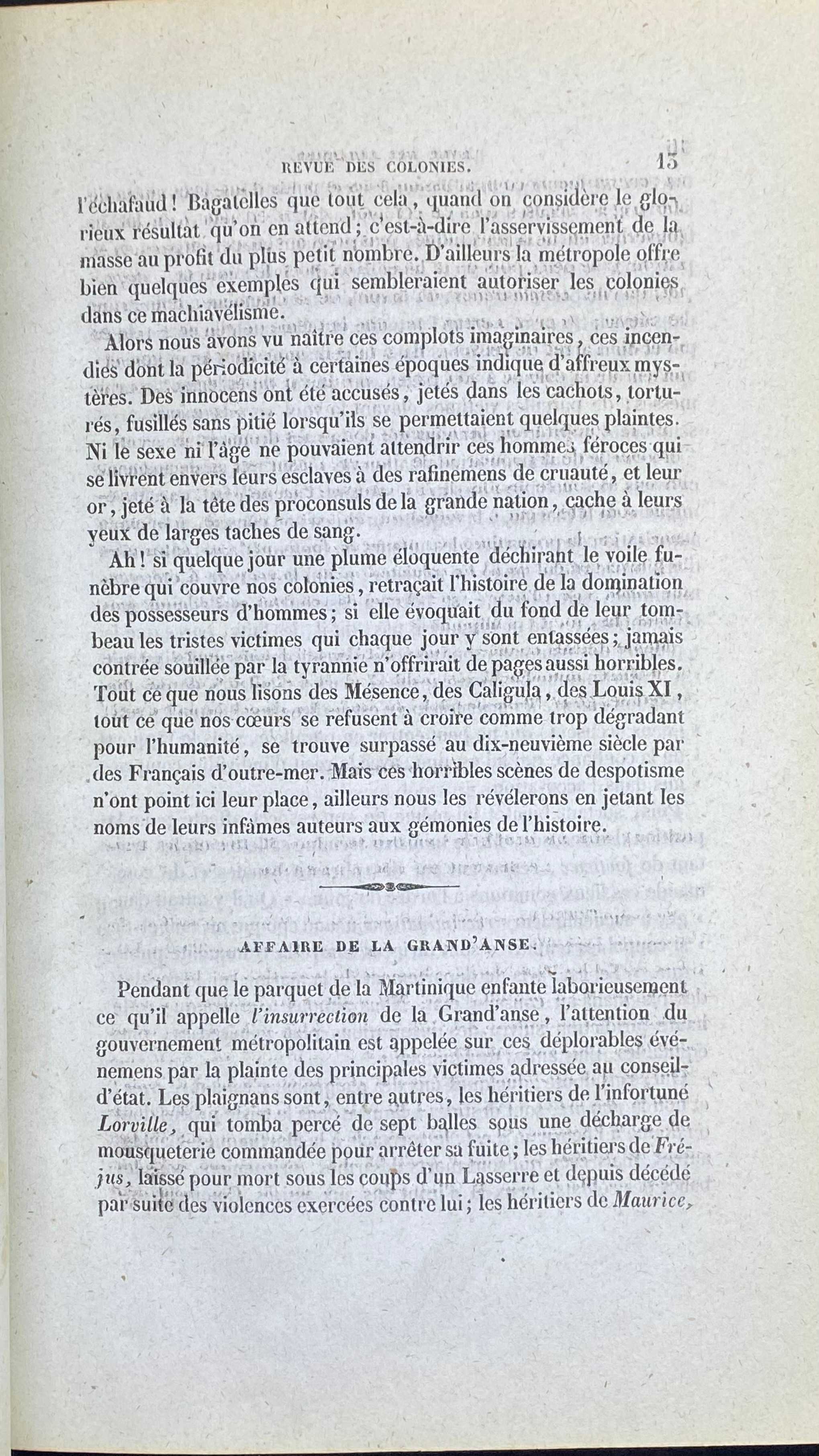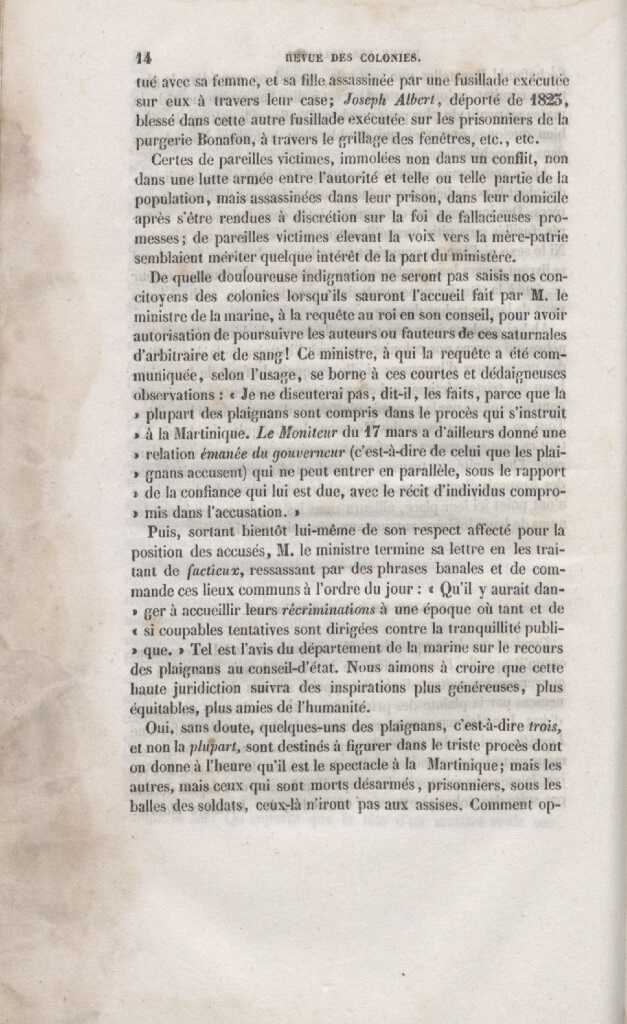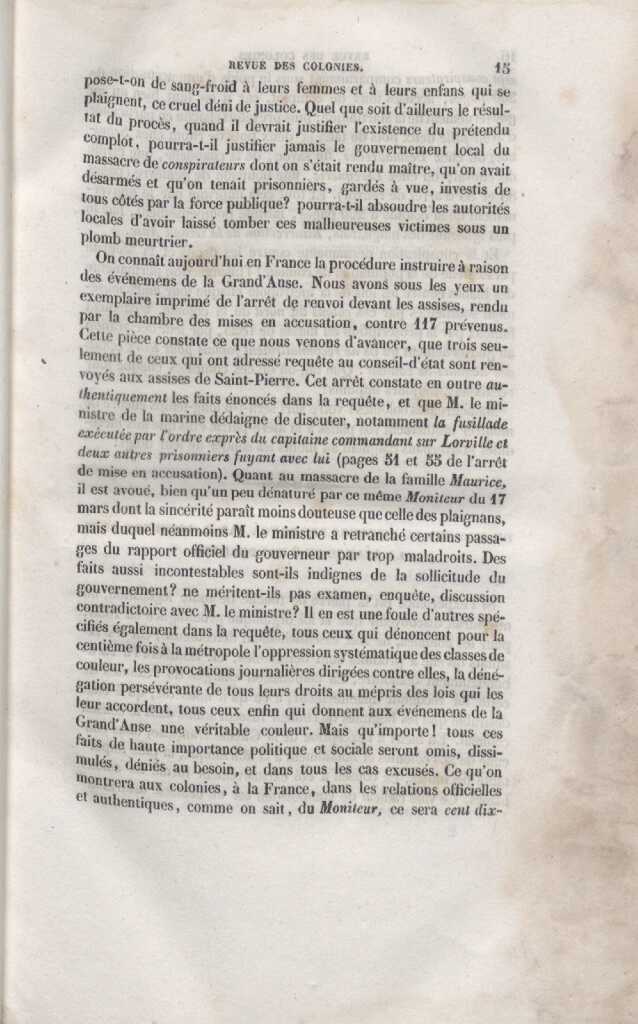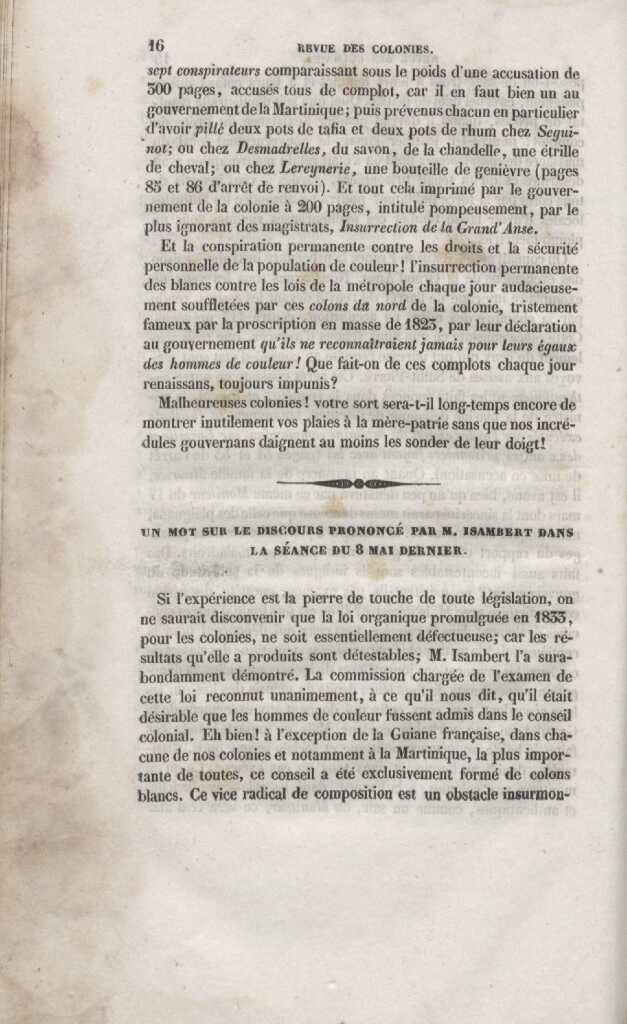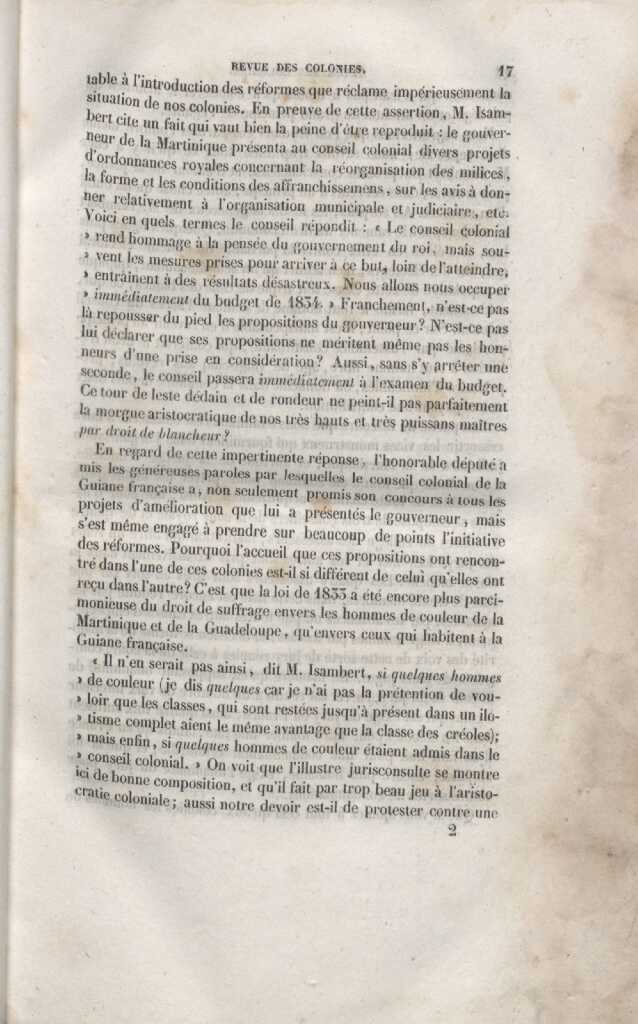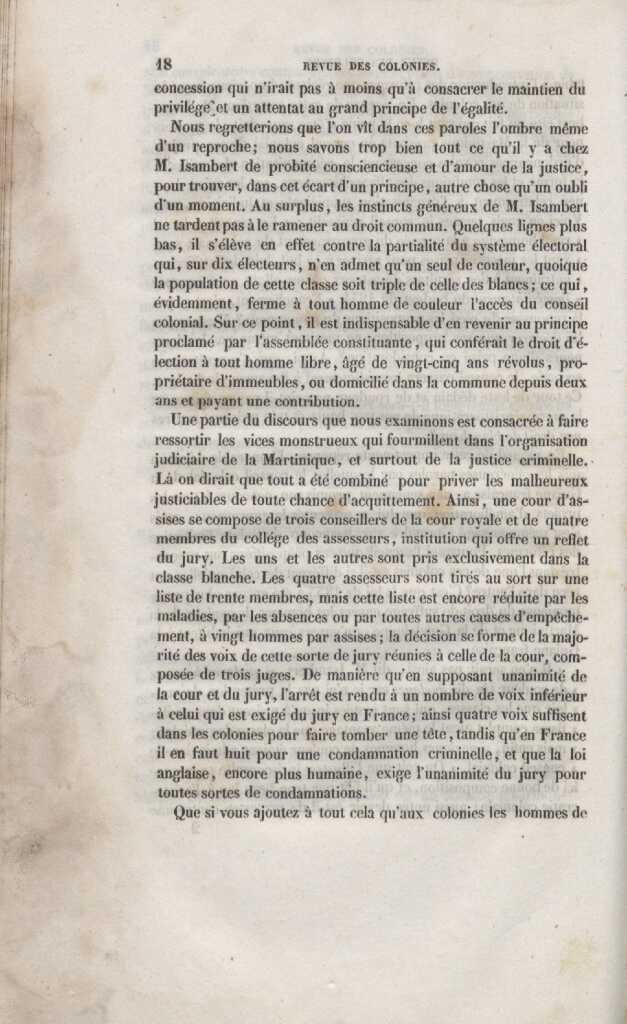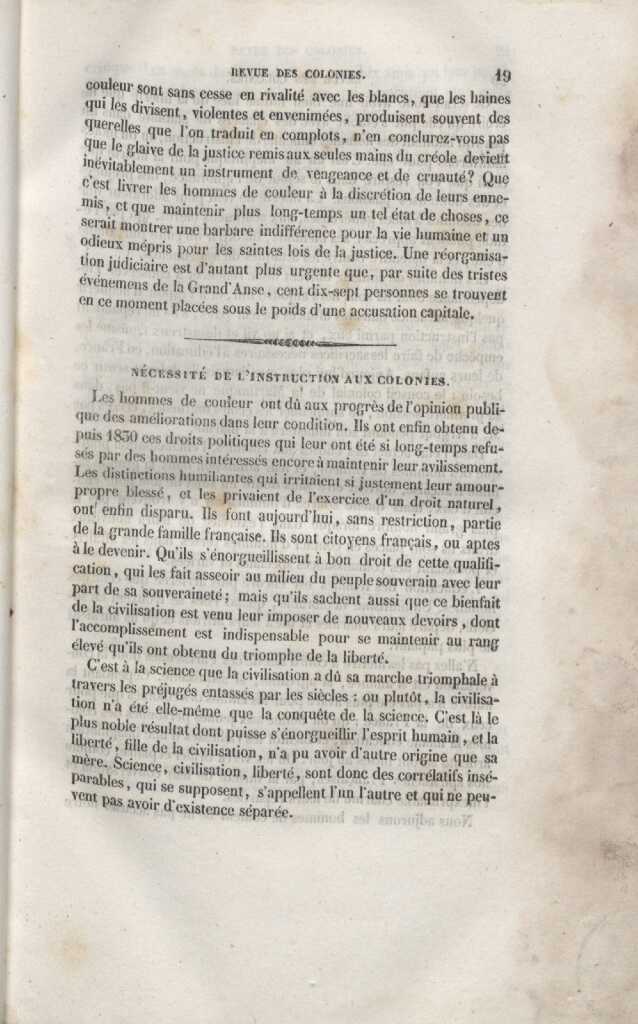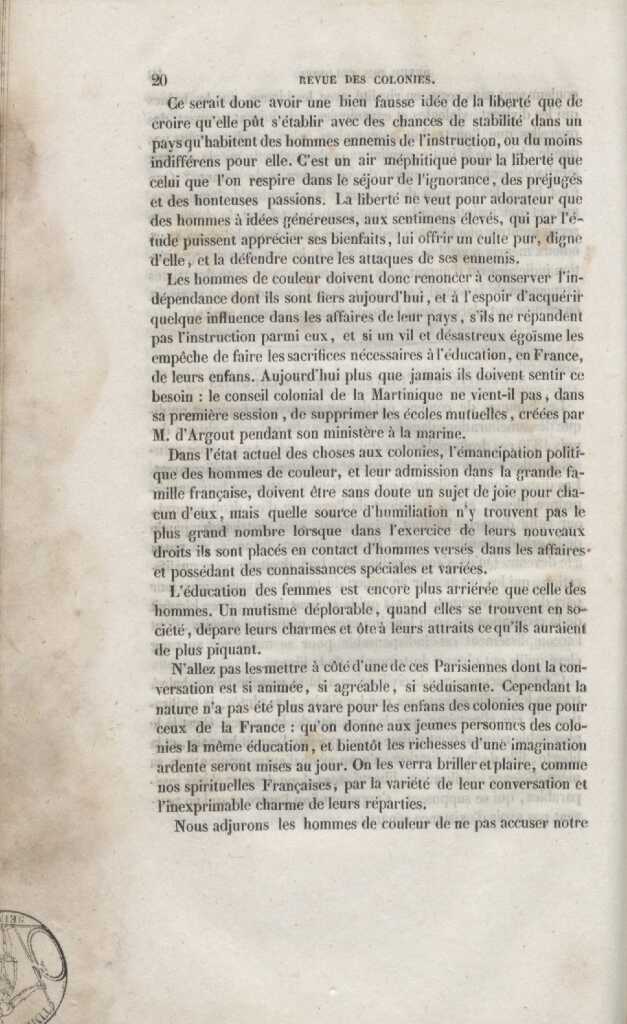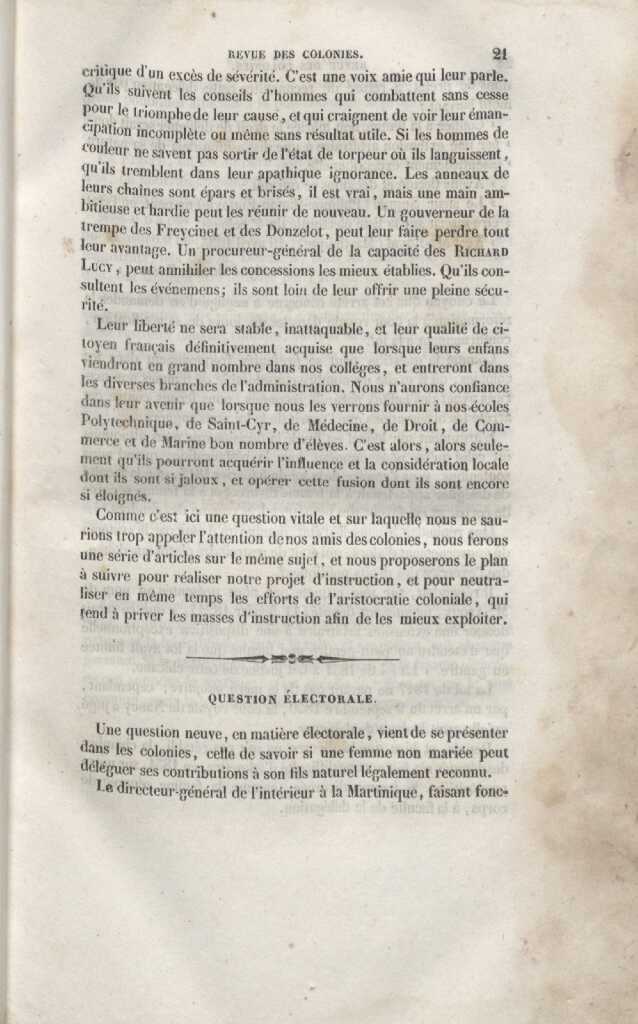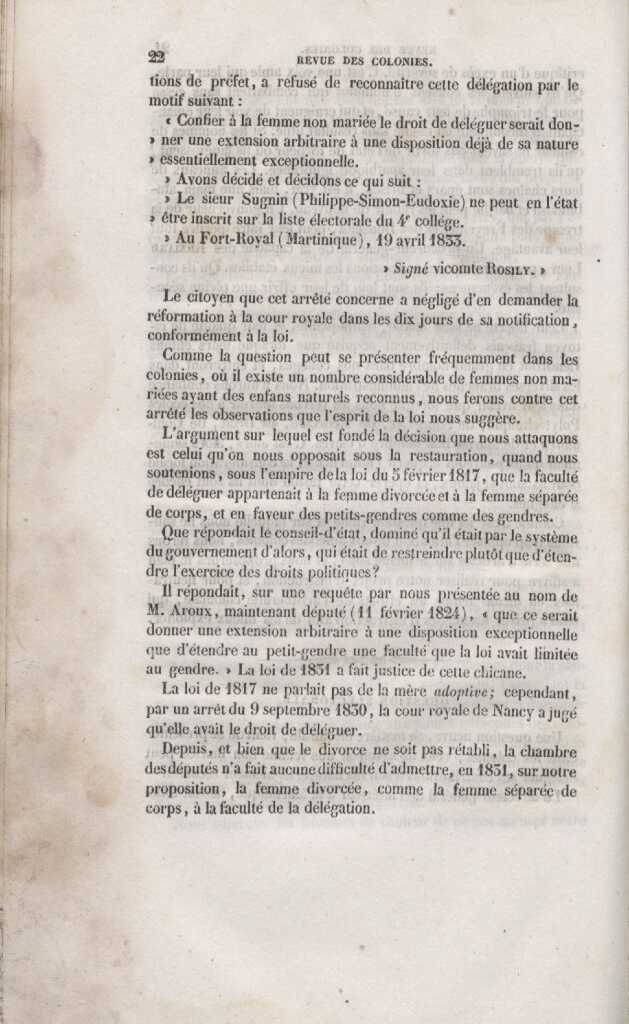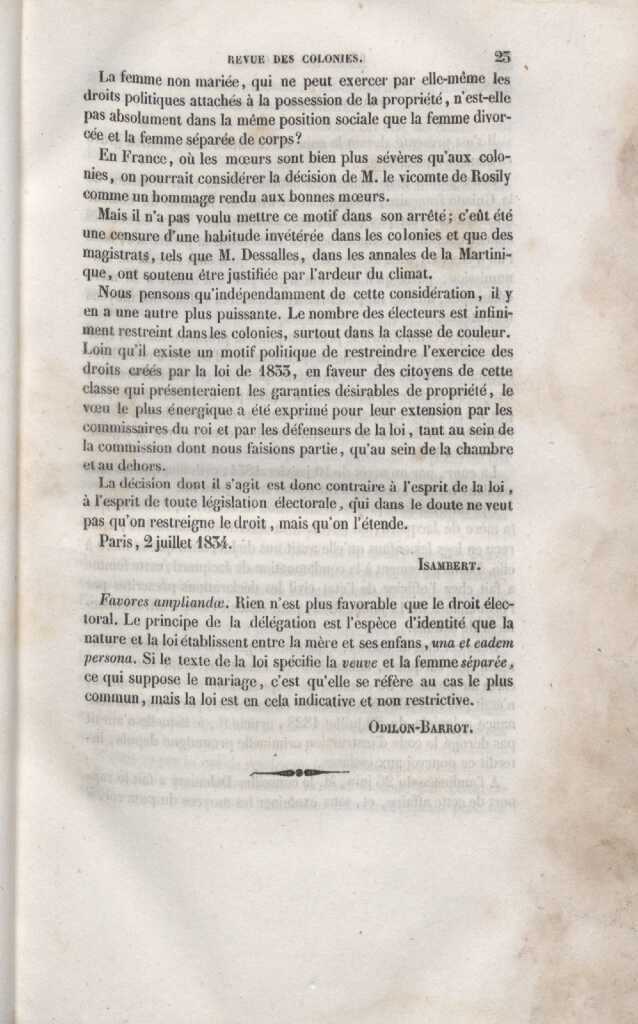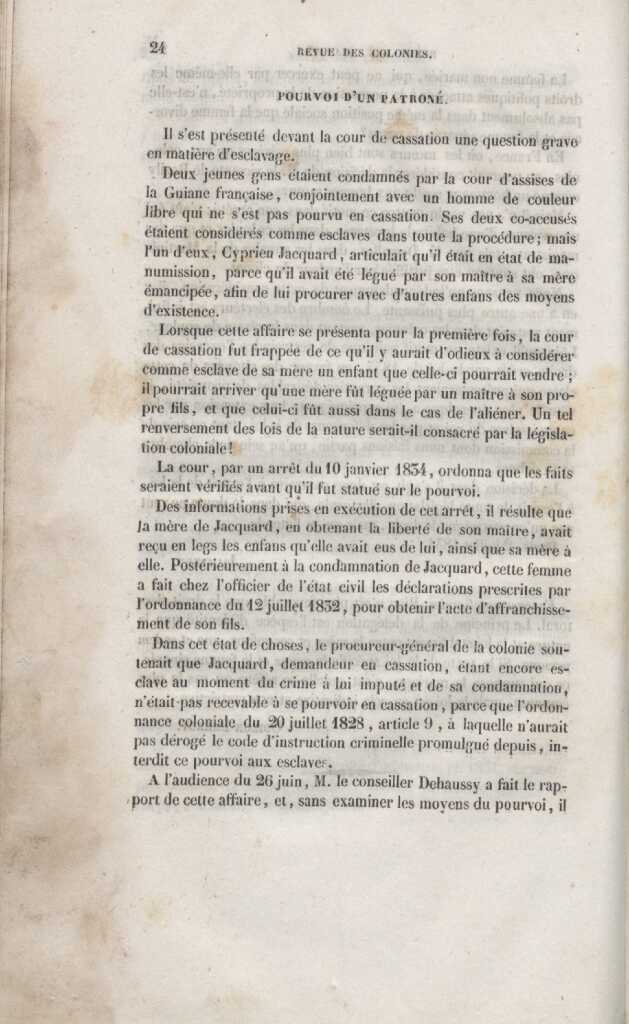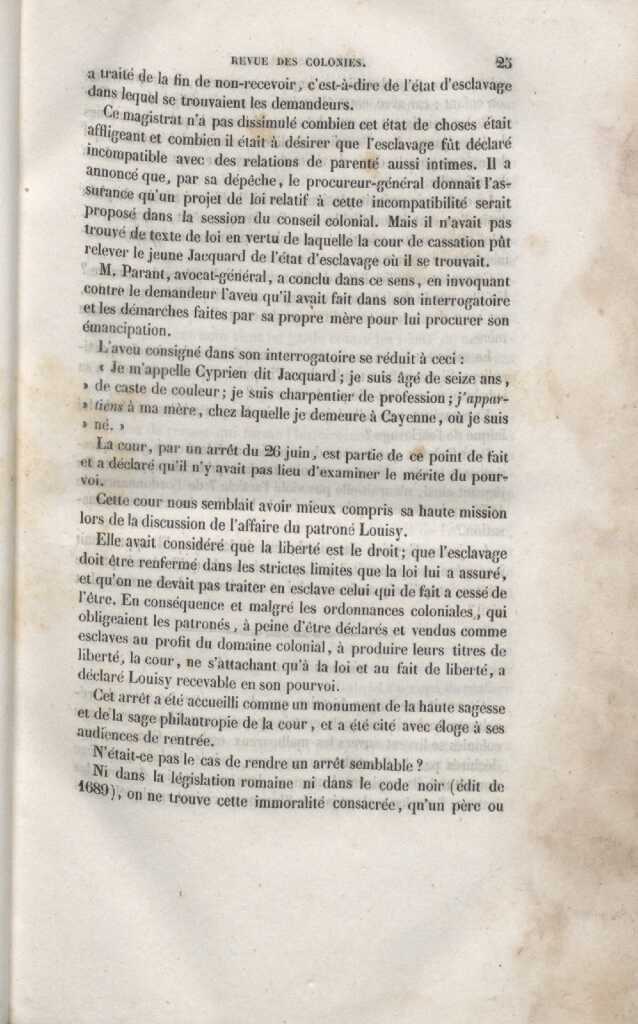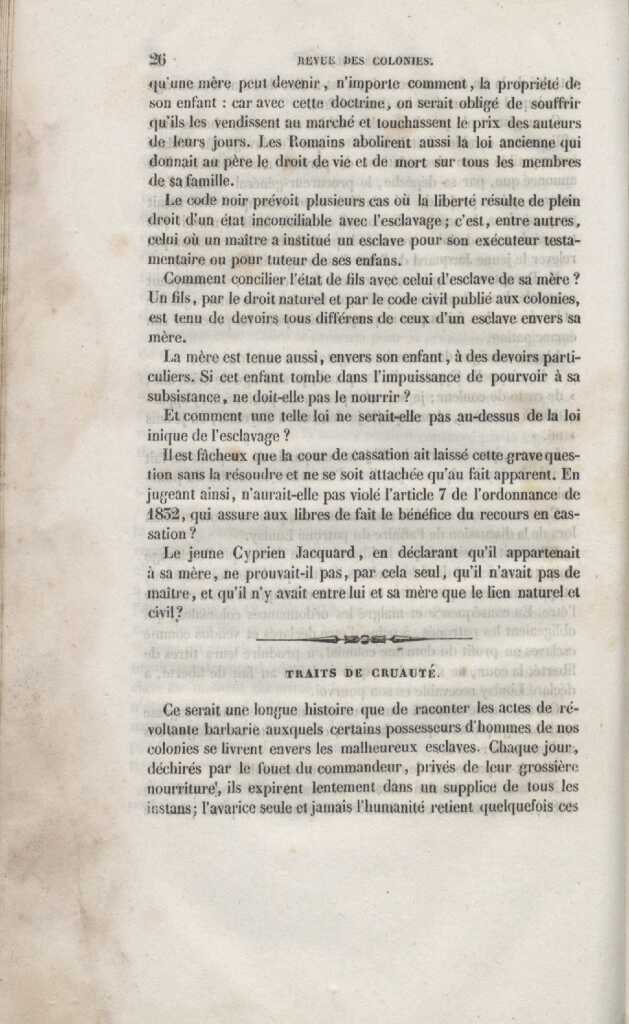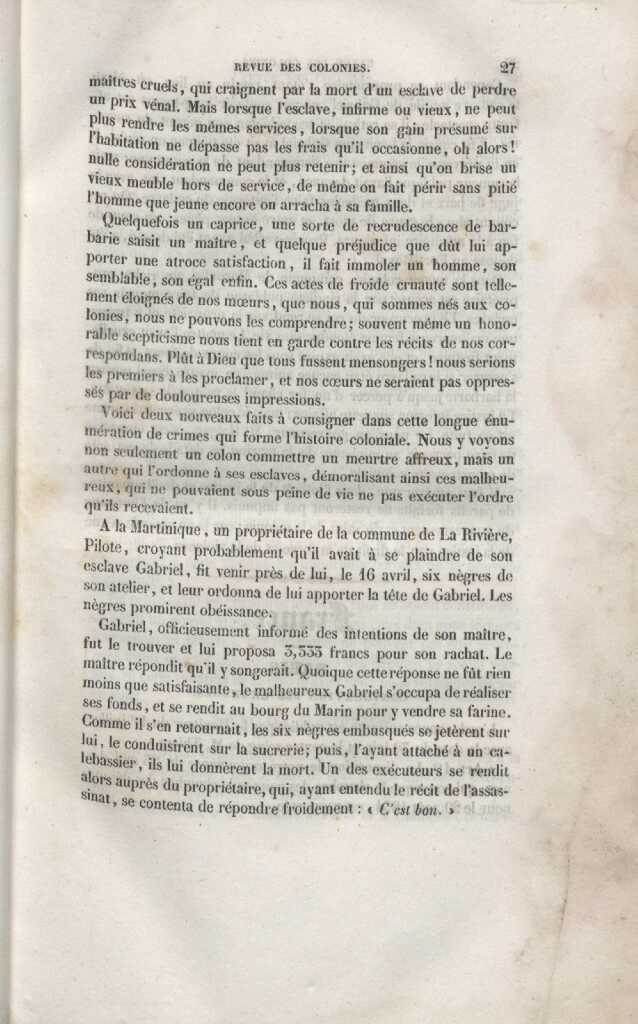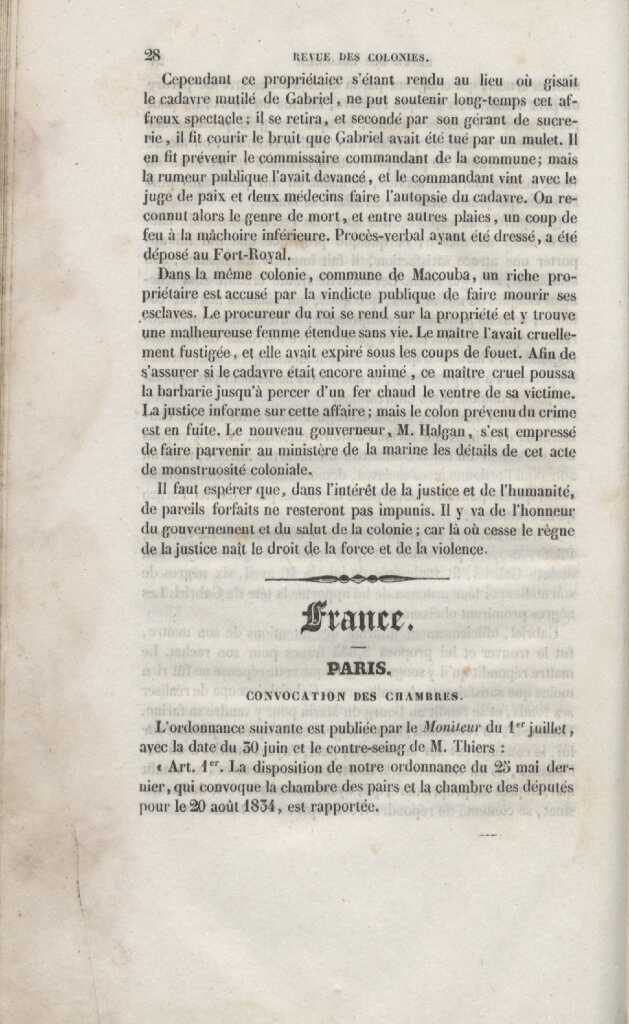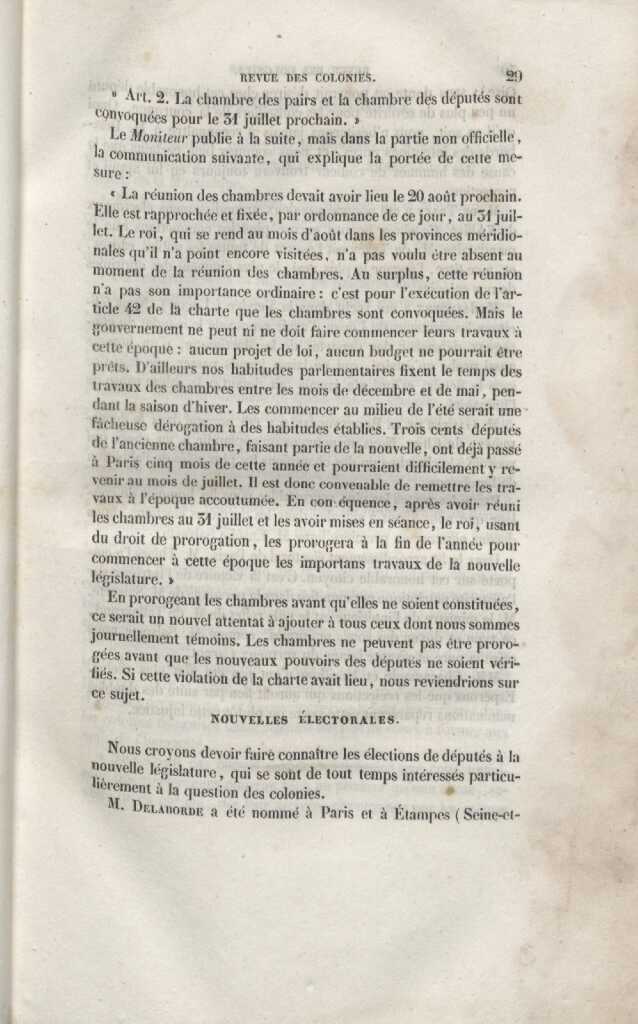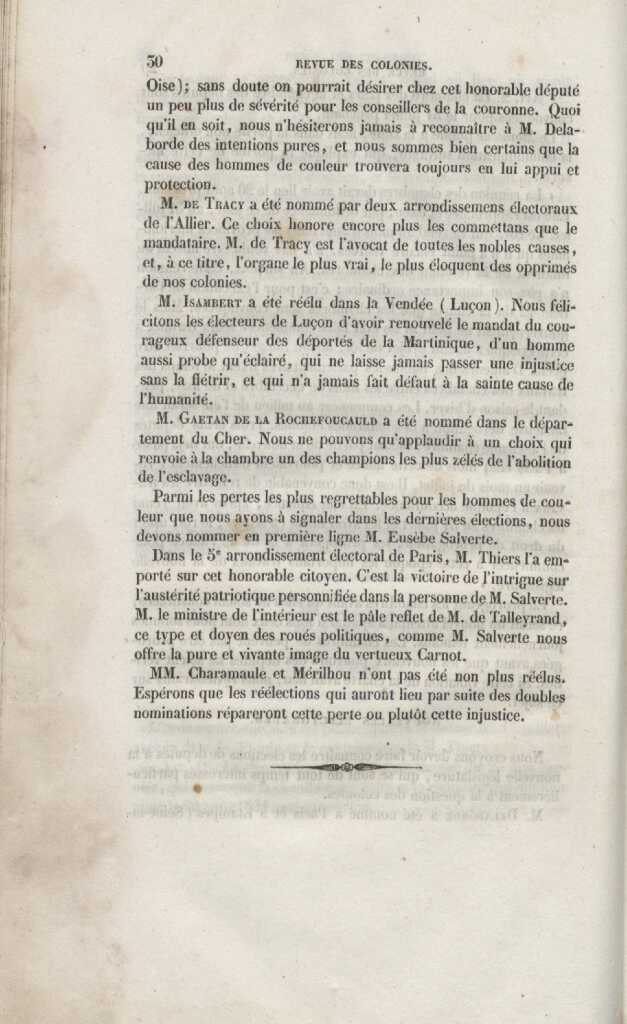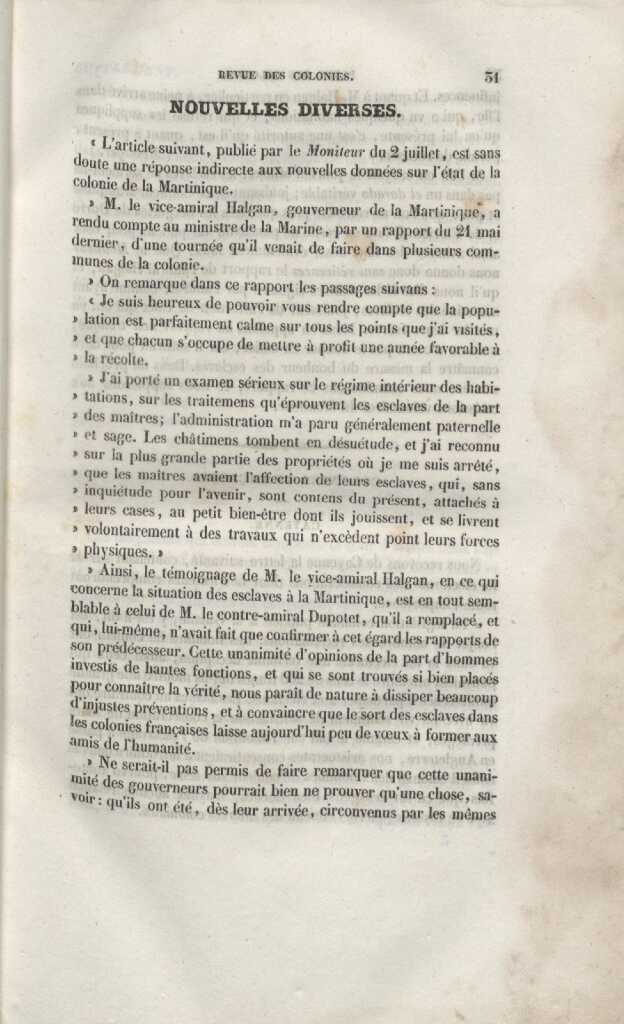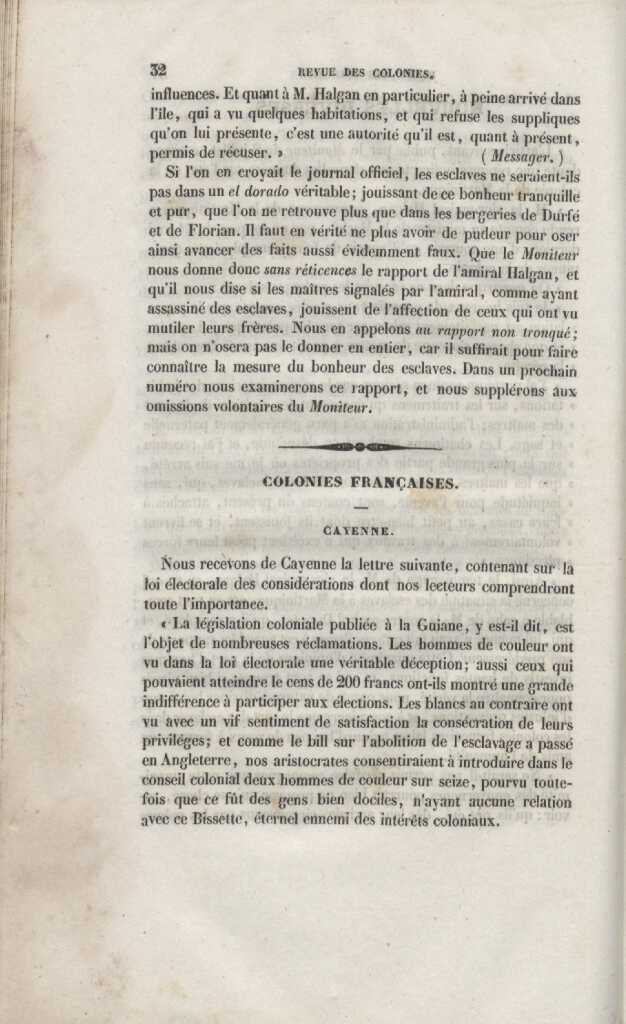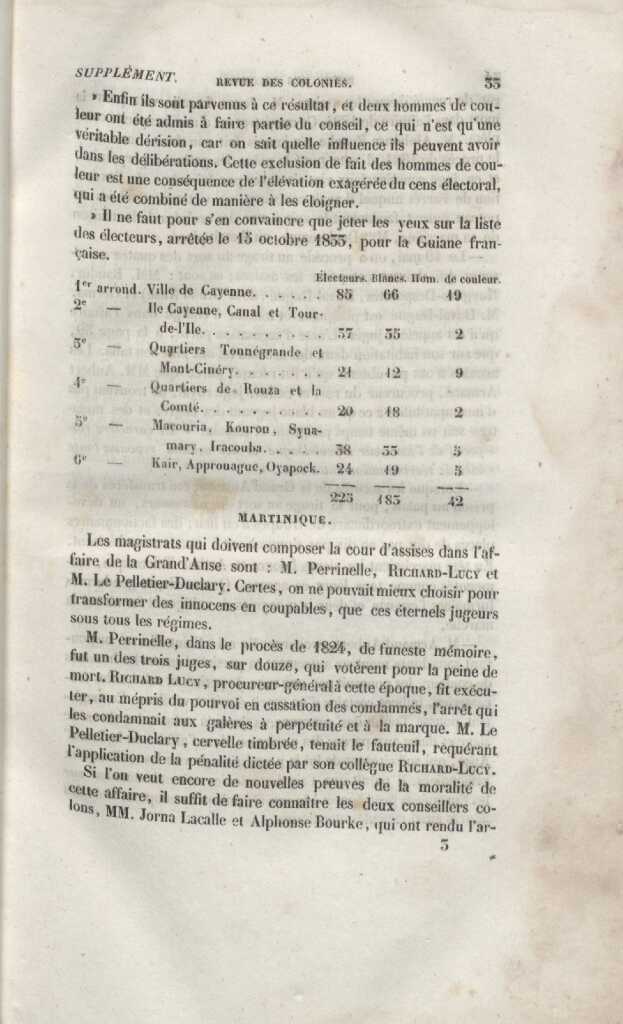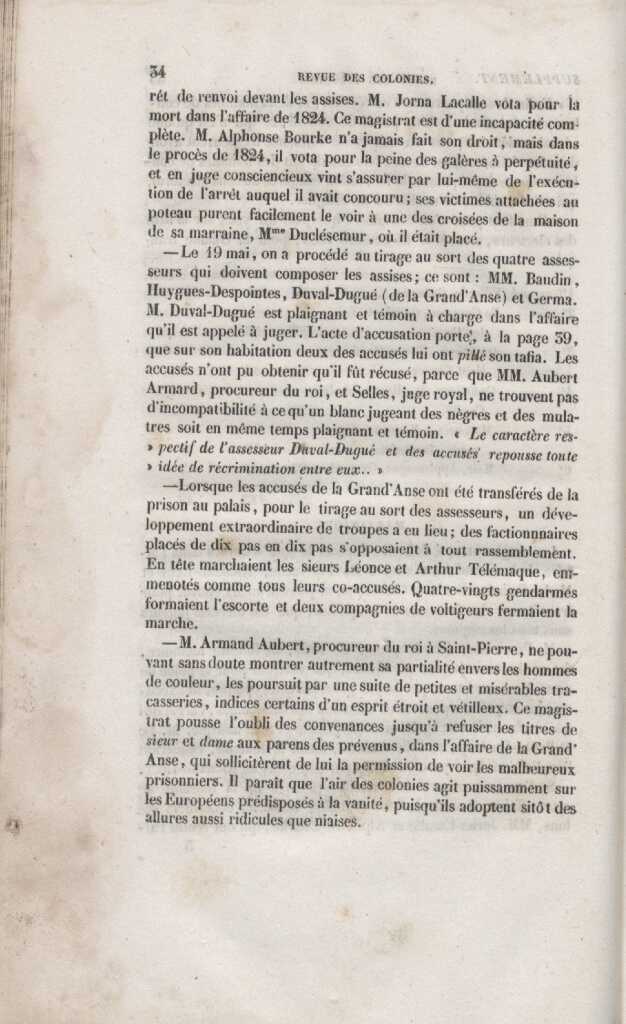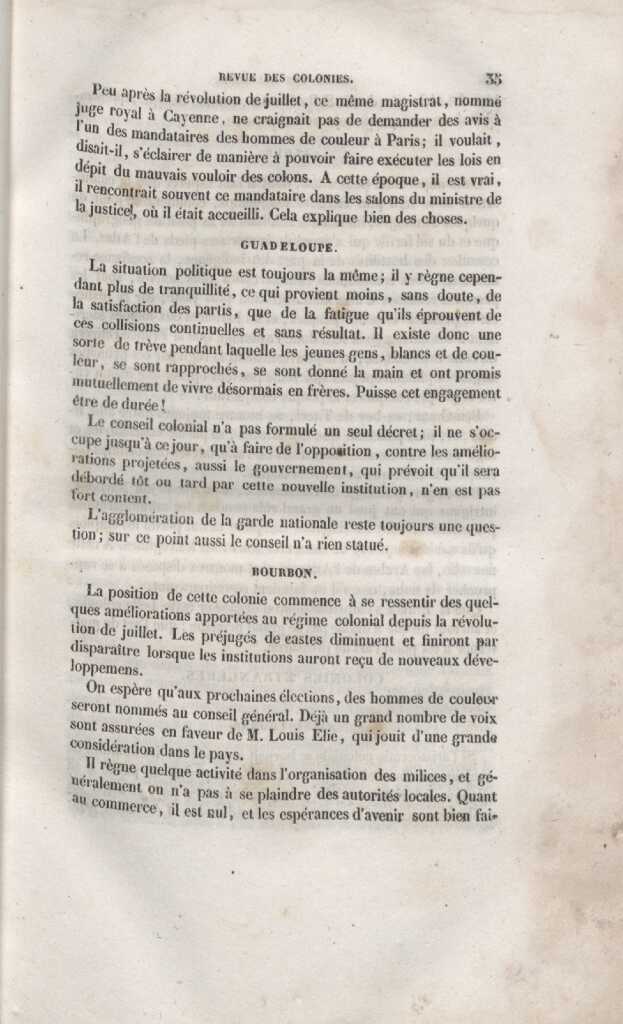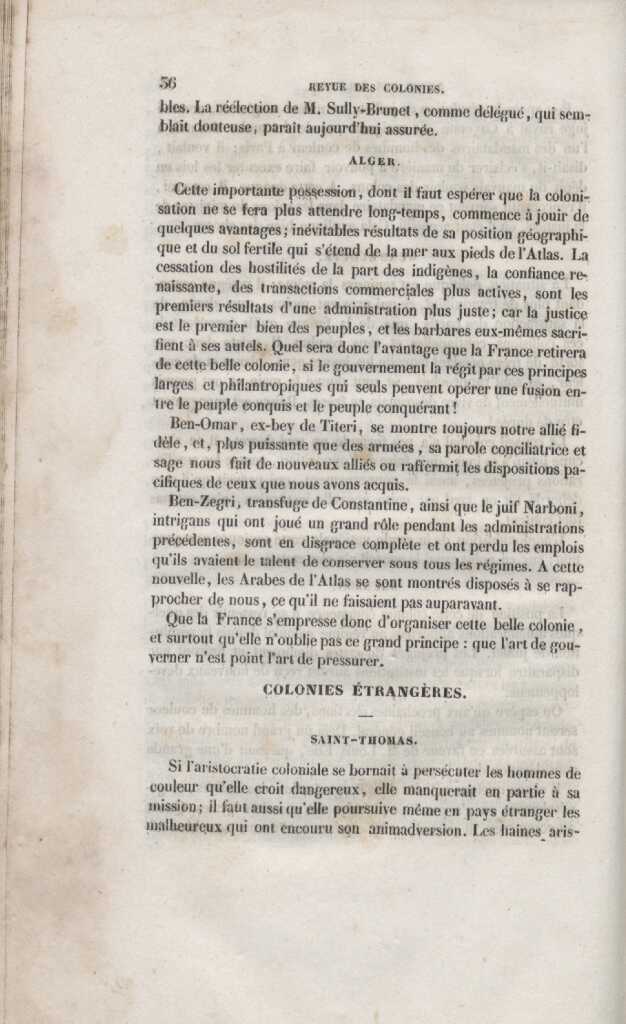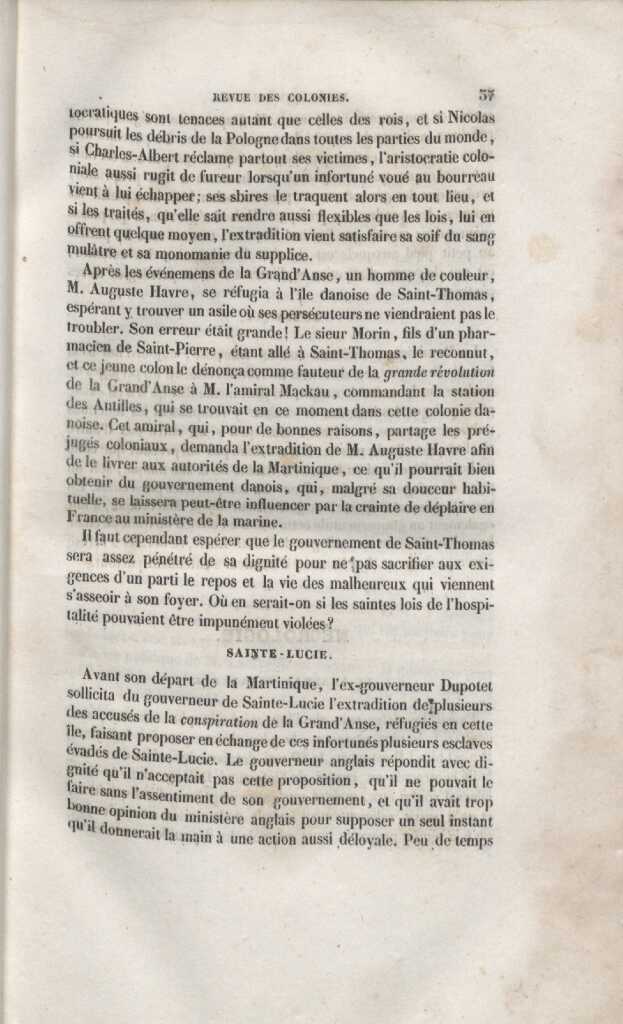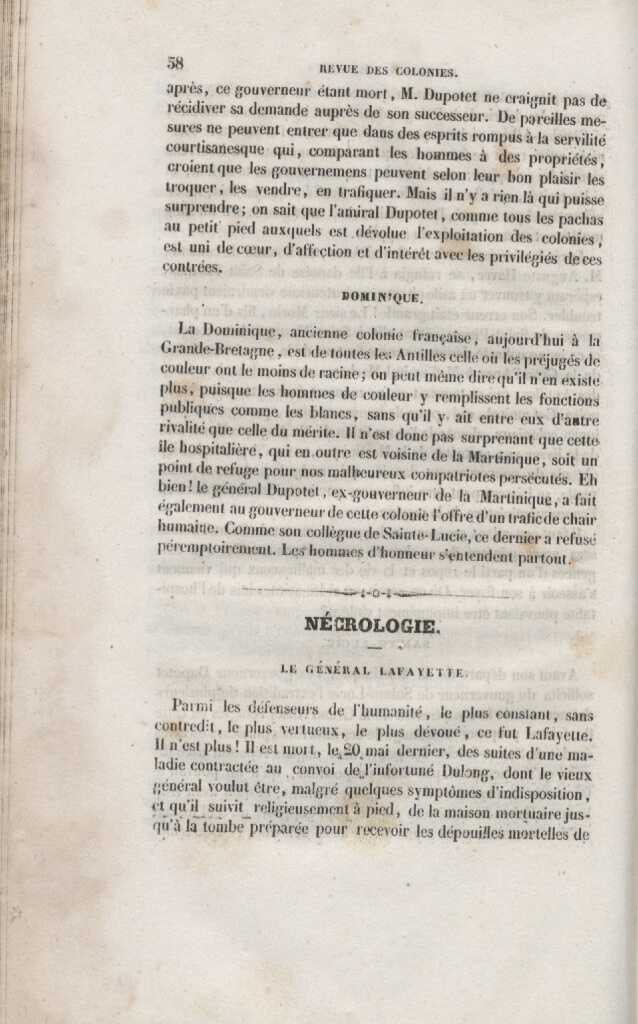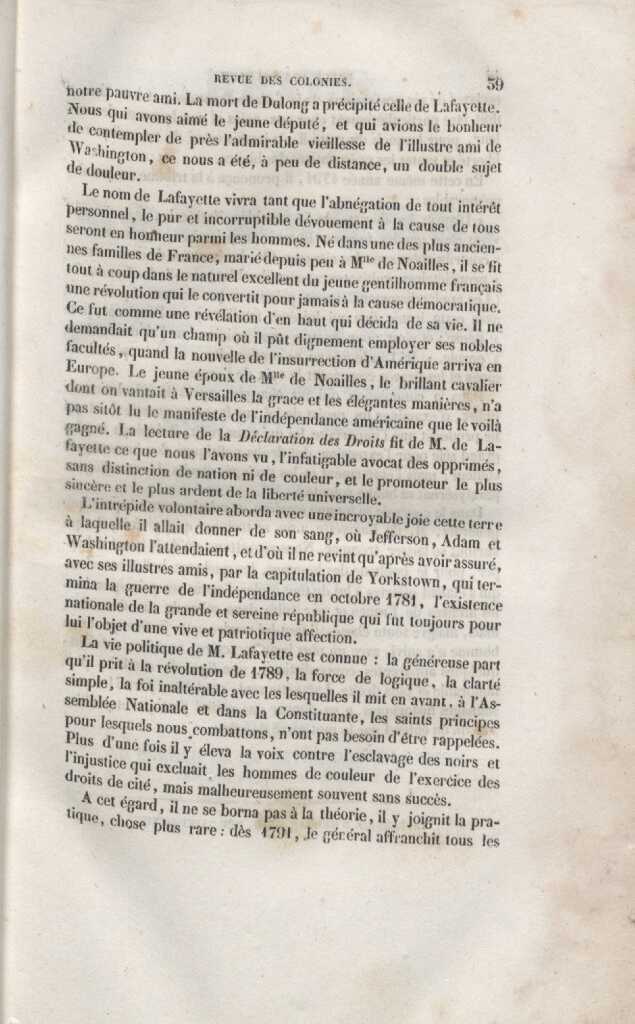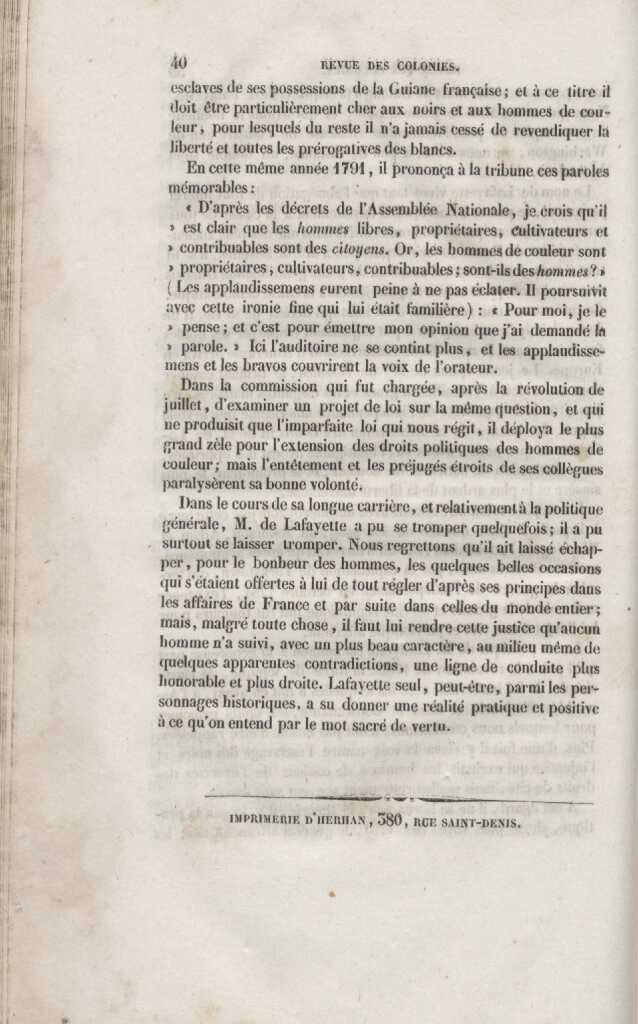Revue des Colonies V.1 N°1 (selection in English translation)
Maria Beliaeva Solomon
Annotated by
A. Lagarde
M. Beliaeva Solomon
A. Louis
A. Brickhouse
Charlotte Joublot Ferré
C. Stieber
E. Hautemont
G. Pierrot
J. Couti
J. Balguy
K. Duke-Bryant
L. Demougin
M. L. Daut
M. Roy
N. Romney
S. E. Johnson
T. Tirkawi
Y. Najm
Publication Information
Information about the source
REVUEDESCOLONIES,
MONTHLY COMPENDIUM[1] OF POLITICS,
ADMINISTRATION, JUSTICE, INSTRUCTION AND COLONIAL CUSTOMS,
BY A SOCIETY OF MEN OF COLORSOCIETY OF MEN OF COLOR
DIRECTED BY C.-A. BISSETTEC.-A. BISSETTE.
N°1July.
PARIS, AT THE OFFICE OF THE
REVUE DES COLONIES,46, RUE NEUVE-SAINT-EUSTACHE
1834.
REVUEDES COLONIES
Prospectus.
As of now, the colonies, generally speaking, only know of the great
principles of philanthropy in theory; of freedom in action, nothing at all.
The suffering and oppressed classes appeal and fight relentlessly, always in
vain. To stimulate the feeble good will to which our rulers limit
themselves, it is necessary to compile the just complaints that arise from
all sides. These claims, these grievances, to be successful, must receive
the greatest publicity: this is the object of our RevueRevue
The debate floor today is no longer enough; petitions are
adjourned by the calculated negligence of rapporteurs or pushed back by the
insolent agendas of the day. On the other hand, colonial authorities, always
disposed in favor of the privileged, cleverly evade the ministers'
prescriptions. Against this hitherto successful tactic of the partisans of
aristocracy and privilege, it is necessary to finally engage the power of
public opinion, enlightened by a discussion always wise, always true, but
energetic and never timid, of the causes, whatever they may be, which hinder
the desirable fusion of the diverse populations of the colonies.[2]
For this purpose, a specialized journal is founded under the title of Revue des Colonies Revue des Colonies,
with Mr. BissetteMr. Bissette as director.
This journal is not only dedicated to all that concerns the colonies,
considered as a source of news and interesting facts apt to occupy the
leisure of the reader, but it devotes itself entirely to the political,
intellectual, moral and industrial interests of colonists of either
color.[3]
Nothing that concerns the French colonies in particular will be omitted from
this monthly publication. The government, the administration, and the
justice system will be examined here with respect to both their actions and
their persons; for it is the latter that too often determines the spirit and
the manner in which populations are either oppressed or well looked
after.
The civil, political, and social rights of the two free classes, which,
having been hitherto divided, ought to be united, will here be advanced and
supported with indefatigable zeal.
The great question of the abolition of slavery, the cornerstone of liberty,
will here be treated with the most conscientious care and the most ardent
love of equality and of the general good.[4]
Arbitrariness and partiality will here be brought to face the court of public
opinion with no distinction between persons. The weak will find here support
and protection, the oppressor, punishment, the official, warranted blame for
his illegal acts, but respect for his person.
The Revue des ColoniesRevue des Colonies will also concern itself with all the
changes made or projected in the legislation that governs foreign colonies
and inevitably affects our own in a powerful way.[5]
National interests, in relation to the possession of AlgiersAlgiers, will find in the Revue des ColoniesRevue des Colonies
a devoted and independent outlet.[6]
Numerous and knowledgeable correspondents ensure that readers find as much
variety as edification in the articles of the Revue des
Colonies.Revue des
Colonies.
DECLARATION OF PRINCIPLES.
The Revue des ColoniesRevue des Colonies believes it must, above all, indicate
by what principles it will offer judgment upon men and things.[7] In its estimation, '89, in the immortal Declaration of
Rights voted by the National AssemblyNational Assembly, laid the
future foundations of all truly democratic institutions; this is why we
inscribe this Declaration at the beginning of this
compendium: these are the tables of our law.
The rights of men had been misunderstood, insulted for centuries;
they have been restored for all mankind by this
Declaration, which will forever remain a rallying
cry against oppressors, and a law for legislators themselves.
(Address of the National AssemblyNational Assembly
to the French People, 11 February 1790.)
Excerpt
FROM THE MINUTES OF THE NATIONAL ASSEMBLYNATIONAL ASSEMBLY OF AUGUST
20, 21, 22, 23, 24, 26 AND OCTOBER 1st, 1789.
DECLARATION OF THE RIGHTS OF MAN IN SOCIETY.[8]
The representatives of the French People, formed into a National
Assembly, considering ignorance, forgetfulness or contempt of the rights
of man to be the only causes of public misfortunes and the corruption of
Governments, have resolved to set forth, in a solemn Declaration, the
natural, unalienable and sacred rights of man, to the end that this
Declaration, constantly present to all members of the body politic, may
remind them unceasingly of their rights and their duties; to the end
that the acts of the legislative power and those of the executive power,
since they may be continually compared with the aim of every political
institution, may thereby be the more respected; to the end that the
demands of the citizens, founded henceforth on simple and incontestable
principles, may always be directed toward the maintenance of the
Constitution and the happiness of all.
In consequence whereof, the National Assembly recognizes and declares,
in the presence and under the auspices of the Supreme Being, the
following Rights of Man and of the Citizen.
Article 1.-Men are born and remain free and equal in
rights. Social distinctions may be based only on considerations of the
common good.
2.- The aim of every political association is the preservation of the
natural and imprescriptible rights of man. These rights are Liberty,
Property, Safety and Resistance to Oppression.
3.-The source of all sovereignty lies essentially in the
Nation. No corporate body, no individual may exercise any authority that
does not expressly emanate from it.
4.- Liberty consists in being able to do anything that does not harm
others: thus, the exercise of the natural rights of every man has no
bounds other than those that ensure to the other members of society the
enjoyment of these same rights. These bounds may be determined only by
Law.
5.- The Law has the right to forbid only
those actions that are injurious to society. Nothing that is not
forbidden by Law may be hindered, and no one may be compelled to do what
the Law does not ordain.
5.-
6.-
The Law is the expression of the general will. All citizens
have the right to take part, personally or through their
representatives, in its making. It must be the same for all, whether it
protects or punishes. All citizens, being equal in its eyes, shall be
equally eligible to all high offices, public positions and employments,
according to their ability, and without other distinction than that of
their virtues and talents.
7.- No man may be accused, arrested or detained except in the cases
determined by the Law, and following the procedure that it has
prescribed. Those who solicit, expedite, carry out, or cause to be
carried out arbitrary orders must be punished; but any citizen summoned
or apprehended by virtue of the Law, must give instant obedience;
resistance makes him guilty.
8.- The Law must prescribe only the punishments that are strictly and
evidently necessary; and no one may be punished except by virtue of a
Law drawn up and promulgated before the offense is committed, and
legally applied.
9.- As every man is presumed innocent until he has been declared guilty, if it should be considered
necessary to arrest him, any undue harshness that is not required to
secure his person must be severely curbed by Law.
10. - No one may be disturbed on account of his opinions, even religious
ones, as long as the manifestation of such opinions does not interfere
with the established Law and Order.
11.- The free communication of ideas and of opinions is one of the most
precious rights of man. Any citizen may therefore speak, write and
publish freely, except what is tantamount to the abuse of this liberty
in the cases determined by Law.
12.- To guarantee the Rights of Man and of the Citizen a public force is
necessary; this force is therefore established for the benefit of all,
and not for the particular use of those to whom it is entrusted.
13. For the maintenance of the public force, and for administrative
expenses, a general tax is indispensable; it must be equally distributed
among all citizens, in proportion to their ability to pay.
14. All citizens have the right to ascertain, by themselves, or through
their representatives, the need for a public tax, to consent to it
freely, to watch over its use, and to determine its proportion, basis,
collection and duration.
15. Society has the right to ask a public official for an accounting of
his administration.
16. Any society in which no provision is made for guaranteeing rights or
for the separation of powers, has no Constitution.
17.- Since the right to Property is inviolable and sacred,
no one may be deprived thereof, unless public necessity, legally
ascertained, obviously requires it, and just and prior indemnity has
been paid.
Excerpt from the minutes of the National
AssemblyNational
Assembly, October 1, 1789. Collated true to the
original. Signed MOUNIER, president; Viscount DE MIRABEAU,
DEMEUNIER, BUREAU DE Pusy, Bishop DE NANCY, FAYDEL, Abbot of EYMAR,
secretaries.
All of the principles of '89 are in this declaration; and, whatever one does,
there is in these principles, which the French revolution, by its republican
and imperial armies, has sown acrossed the land of
Europe, and by its books everywhere in the
universe, a power which cannot be suppressed.
Certainly, if a man should be reminded of anything, it is his rights, which
aristocracies may well succeed in making obsolete here and there, but to
which the future belongs.
We ask that we compare the present state of our legislation with this page of
justice and liberty, that we examine whether the laws that are made for us
are in conformity with the principles of this declaration, which must be
forever, according to the fine expression of the National
AssemblyNational
Assembly, the law of the legislators themselves.
And if this examination clearly shows that the government, whatever it may
be, is not founded on this one equitable basis — the enforcement of the
rights of all — those who, like us and with the National
AssemblyNational
Assembly, will be convinced that ignorance,
forgetfulness or contempt for the rights of man are the only causes of
public misfortunes and the corruption of governments, will
triumphantly conclude that all the evil of the present situation, in the
colonies as everywhere, is absolutely a result of this ignorance, of this
forgetfulness or of this contempt, we cannot precisely say which, as much on
the part of the rulers as on that of the governed.
The director, BISSETTEBISSETTE.
A LOOK AT THE COLONIAL REGIME AND ITS EFFECTS.
The deplorable events of Grand'Anse, [9]
MartiniqueMartinique have echoed through every
newspaper. Some, inspired by the authorities, in whose eyes all that is
emancipation becomes an object of terror, have presented this affair in an
unfavorable light to those who have limited themselves to passive
resistance.[10] Others, more benevolent, and above
all, more impartial, were careful not to pass premature judgment on a matter
of this nature: they knew that passion exaggerates both evil and good, and
that one should not rush to adopt the words of a
powerful and often unjust party.
We too will attend to this matter, but by prefacing it with all the
considerations necessary to draw the correct conclusions.
These facts, which seem to us hardly believable, are repeated every day with
impunity in our colonies. And how could it not be so, when the men charged
with maintaining the laws are those most interested in violating them!
Arbitrariness is therefore only the sad corollary of a state of affairs
whose origins date back to a time of conquest, plunder and brutal violence.
We know that this arbitrariness exists; philosophy has decried it; power
itself seems to reject a shameful solidarity, and yet nothing real has been
done to put an end to it. Everything has been deceit and lies, from the
illusory measures against the slave trade, to the laws which seem to grant
men of color the rights of citizens, and a justice which one could not
truthfully represent scales in the hand.
These causes, which, deriving from the overall regime of the colonies, would
seem foreign to the events of Grand'Anse, to which we will attend more
particularly, [11] are nevertheless attached to them by a
multitude of threads: for nothing in the fate of peoples, as in that of men,
is isolated, and the actual effects are often produced by causes lost to the
depths of time.
The colonies too, despite their distance from the motherland, felt the
effects of the great political commotion which regenerated
France. A long subjugation, largely exploited by
the aristocracy, had not been able to paralyze hearts so much that they did
not feel warmed by the rays of the sun of freedom. Men of color especially,
more advantaged than the unfortunate slaves, turned their eyes towards
France with love and confidence; they felt that each link which fell from
the chains of old Europe was for them a pledge of emancipation. The
emblazoned nobility, elevated to the rank of people, offered an edifying
lesson to the nobility of the skin,[12] which did not even
possess the prestige of the former's personal accomplishments. The
destruction of one was the sure guarantee of the destruction of the other.
Was not the emancipation of the people, who had long suffered the bondage
of the field, also a sign of freedom for the
slaves? There was therefore in the colonies what is still there today, an
absurd aristocracy clinging to its privileges and willing to go to any
length to preserve them, and on the other hand a population full of verve,
of energy, beginning to understand its rights and its dignity.
Such, then, was the position of the colonies when the July revolution,[13] so rich in prospects, made conceivable for a moment
the awakening of France. The new government, carried along, no doubt in
spite of itself, by the force of circumstance, not daring to lift the veil
which hid its ulterior motives, finally bowing before public opinion which
had just had its impact felt, erased the word regulations from
the article of the charter concerning the colonies. It declared that the
colonies would be governed by special laws[14]. This tacit recognition of abuses of all kinds, originating in the
corrupted system of ordinences, stoked the hopes of those who could still
put some faith in ministers' promises. It was because they did not believe
that a government born of democracy could so quickly forget its origin; they
did not comprehend that the preservation of titles of nobility, of a
so-called upper chamber, and above all of an exaggerated civil list were
milestones laid down by the nascent power to constitute itself on bases
similar to that which the popular arm had just crushed. Did not the
preservation of the titled nobility in the motherland,[15]
and the addition that was made to it of a Turcarets aristrocracy,[16] clearly impart to the colonies that, except for a few
slight adjustments, their aristocracy of skin would be preserved along with
most of its privileges.
Indeed these fine particular laws were rendered so illusory as
to match the ordinances' arbitrariness,[17] differing from
them only by the hypocrisy of the name. For example, is not the electoral
law, establishing the political rights of whites and of men of color, a work
of perfidious deception? On the isle of
Bourbonisle of
Bourbon and of CayenneCayenne,
where the whites are in overwhelming majority, the electoral qualification
and eligibility are fixed at a lower rate, for there is no fear of
competition; but in the colonies of Guadeloupe
Guadeloupe
and MartiniqueMartinique, where the
population of color, quite numerous, is of average wealth, the tax is preemptively raised to an unattainable level.
Is there anything more perfidious, I would even say more odiously ironic,
than to thus concede the right while prohibiting the means. Would it not
have been truer to declare outright that only whites could vote?[18]
It became difficult, in the presence of this law of political organization,
creating or rather sanctioning a privilege, to allow for the action of the
popular will. The national guard, that admirable institution of the
métropole,[19] had a pale imitation in the colonies,
where both the name and the democratic element of election were carefully
banished.
If France has a national guard, the colonies have a militia whose officers,
appointed by the governor, are generally taken from the white population and
from among a few men of color. These, to keep a rank obtained by favor,
devote themselves unquestioningly to the governor and become his
accomplices. We hasten to say that, among those promoted, we count friends
who have not wavered in their political opinions, but not all of them are
so. When power makes itself odious by its partiality, it always corrupts the
men who make themselves its supporters. What bonds can indeed unite men who
find themselves in a position so false as the colonial militia and its
leaders? Trust? It does not exist. Fraternity? it would be vain to search
for it there. So there remains only force, and it is indeed felt
everyday.
In the judicial system, abuses abound, and they are always to the advantage
of the aristocratic class. The royal courts and the magistrates' courts are
constituted in such a way as to let the whites become judges and parties in
their own cause. Finally, despite the very text of the charter, provost
courts can still bloody the soil of the colonies by legally assassinating
the innocent people they want to get rid of.
Well! in the presence of this boundless arbitrariness, leaning on their
numerous privileges, the whites groan and complain that the government has
dared to touch the holy ark of their power, by diminishing some of their
privileges. Political rights, they possess them all; the judicial power is
in their hands; law enforcement, they direct and
command it; but it is not enough to suit their wounded pride. A principle,
admittedly without application, has been issued; the word equality was
spoken, was it not enough to offend those selfish and hard hearts for whom
every independent man who is not part of their league is but a worthless
rebellious slave?[20] Men of color, on the contrary,
confident in the government's feeble pledges of good will, waited patiently
for better days perfecting their political education so as to wield the
influence that they are entitled to in their country by their rights and
numbers. And what do they really want that is not wise and reasonable?
Placed in their land in the same position as the third estate in France
before the revolution, they then ask what this order commanded: liberty and
equality. But they are dealing with privileged people who are even more
tenacious than the nobility and clergy of France. These at least did not
have the impudence to deny the title of men to their adversaries.[21]
By what means, then, could the privileged recover the integrity of their
privileges? To ask the government for them was impossible, they would have
been told to bide their time; that the compromise was only a matter of
painful necessity; that, moreover, the liberties granted to the mulattoes
were purely illusory, being limited in reality to a few slight concessions
of sociability.[22] And furthermore these same concessions
often bend according to the whims of the aristocracy. These answers, which
would satisfy less impatient, and above all less prideful men, would have
deeply wounded those imperious masters whose despotism is exercised without
control over unfortunate slaves. It was therefore necessary to employ all
means, even calumny, to subjugate the class of color and crush it.[23] It had to be represented as factious, turbulent,
having sworn to destroy the whites and stopping at nothing, not murder, not
arson, to accomplish this. It is so easy to slander men who are not allowed
to defend themselves! To find guilty the enemy that one judges oneself! And
then the colonies also count among their ranks men who know how to create
conspiracies, foment them, cause them to arise at the right time, in order
to take advantage of them in their own interest. And what does it really
matter that the worthless blood of a few negroes comes to redden the ground!
What does it matter if a mulatto's head rolls on
the scaffold! Mere trifles, when you consider the glorious result expected
of it; that is, the bondage of the many for the benefit of the few. Besides,
the métropole offers a few examples which would seem to authorize the
colonies in this Machiavellianism.
And so we have seen the birth of these imaginary plots, these conflagrations
whose frequency during certain periods bespeaks frightful mysteries.
Innocents have been accused, thrown into dungeons, tortured, shot without
pity when they allowed themselves a few complaints. Neither sex nor age
could soften these ferocious men who subject their slaves to the most
sophisticated cruelties, and their gold, thrown at the heads of the
proconsuls of the great nation, hides large stains of blood from their
eyes.
Ah! if some day an eloquent pen tearing the funereal veil which covers our
colonies, would retrace the history of domination of the possessors of men;
if it evoked from the depths of their tombs the sad victims who are heaped
there every day, never would a country defiled by tyranny offer such
horrible pages.[24] All that we read of the Mésences, the
Caligulas, the Louis XIs,[25] all that our hearts refuse
to believe as too degrading for humanity, finds itself surpassed in the
nineteenth century by overseas Frenchmen. But these horrible scenes of
despotism have no place here, elsewhere we will reveal them by throwing the
names of their infamous authors among the ignominies of history.
THE GRAND'ANSE AFFAIR
While the public prosecutor’s office of MartiniqueMartinique laboriously gives birth to what it calls the insurrection of Grand'Anse, the
metropolitan government’s attention is drawn to those deplorable events by
the complaint of the principal victims addressed to the Council of State.
The plaintiffs are, among others, the heirs of the unfortunate
Lorville, who fell pierced by
seven bullets under a volley of musketry ordered to stop his escape; the
heirs of Fréjus, left for dead under the
blows of a Lasserre and since deceased as a result of
the violence exercised against him; the heirs of
Maurice
killed with his wife, and his daughter murdered
by a volley shot through their hut; Joseph AlbertJoseph Albert, deported in 1823, wounded in that
other shooting carried out on the prisoners of the Bonafon purgerie, through
the window gratings, etc., etc.
Admittedly, such victims, immolated not in a conflict, not in an armed
struggle between the authorities and such and such part of the population,
but murdered in their prison, in their home after having surrendered on the
faith of fallacious promises; such victims raising their voices to the
mother country seemed worthy of some attention on the part of the
ministry.
With what painful indignation will our fellow citizens of the colonies be
seized when they learn how the the Minister of the
Navythe Minister of the
Navy welcomed their request to the kingking in his council for
authorization to prosecute the authors or culprits of these saturnalia of
arbitrariness and bloodshed! The
ministerminister to whom the request
was communicated, according to custom, contented himself with the following
short and disdainful observations: “I will not discuss the facts because
the majority of the plaintiffs are included in the trial currently being
heard in MartiniqueMartinique. The MoniteurMoniteur of
March 17 has moreover published a report
emanating from the
governorthe
governor (that is to say, the
person whom the plaintiffs accuse) which, given the confidence he is
owed, cannot be entered alongside the account of individuals compromised
in the accusation.”
Then, soon shedding his affected respect for the position of the
accused,
the minister
the minister ends his letter by calling
them factious men, rehashing in banal and hackneyed phrases the
commonplaces of the day: “ That it would be dangerous to entertain their
recriminations at a time when so many and such culpable
attempts are directed against public peace. Such is the opinion of the
Department of the Navy on the recourse of plaintiffs to the Council of
State. We like to believe that this high jurisdiction will follow
inspirations that are more generous, more equitable, more friendly to
humanity.”
Yes, indeed, some of the plaintiffs–that is to say three, not
the majority–are destined to feature in the sad trial which is
currently being staged in MartiniqueMartinique; but the others,
but those who died unarmed, prisoners, under the soldiers’ bullets, those
will not go to the assizes. How can one counter in cold blood the complaints of their wives and children with this cruel
denial of justice? Whatever the result of the trial, even if it were to
prove the existence of the alleged conspiracy, could it ever justify the
local government’s massacre of conspirators who had been captured, disarmed
and who were held prisoners, kept in sight, besieged on all sides by law
enforcement? will it absolve local authorities for letting these unfortunate
victims fall under a rain of murderous lead?
We know today in France what procedure was initiated because of the events of
Grand'Anse. We have before us a printed copy of the order for remand to the
assizes, issued by the indictment chamber, against 117 defendants. This
document notes what we have just said, that only three of those who have
addressed a request to the Council of State are referred to the Assizes of
Saint-PierreSaint-Pierre. This decision also authentically
establishes the facts stated in the request, and which the Minister of the NavyMinister of the Navy disdains
to discuss, in particular the shooting carried out on
Lorville and two other prisoners fleeing with
him, by express order of the captain in command (pages 51 and 55
of the indictment). As for the massacre of the
Maurice family, it is
acknowledged, albeit in a somewhat distorted account, by this same
MoniteurMoniteur of March 17, whose sincerity seems
less doubtful than that of the plaintiffs, but from which nevertheless the
Minister has removed certain, overly clumsy, passages of the governorgovernor's report. Are facts
so incontestable unworthy of the solicitude of the government? do they not
deserve examination, investigation, adversarial discussion with the
MinisterMinister? There are
a host of others also specified in the request, all those who denounce to
the métropole for the hundredth time the systematic oppression of the
classes of color, the daily provocations directed against them, the
continued denial of all their rights in defiance of the laws that grant
them, finally all those others which give true color to the events of
la Grand'Anse. But what does it matter! all these
facts of high political and social importance will be omitted, concealed,
denied if necessary, and in all cases excused. What the so-called official
and authentic relations of the MoniteurMoniteur will
show to the colonies, to France, is one hundred and seventeen conspiratorrs appearing in court
under the weight of a 300-page charge, all accused of conspiracy, for the
government of MartiniqueMartinique needs one; then each one in
particular accused of having looted two jars of tafia and two jars of rum
from Seguinot; or from
Desmadrelles, soap, candles, a
horse's currycomb; or from Lereynerie, a
bottle of jenever (pages 85 and 86 of the order for reference). And all this
printed by the government of the colony over 200 pages, pompously titled, by
the most ignorant of magistrates, Insurrection of
Grand'Anse.
What of the permanent conspiracy against the rights and personal safety of
the population of color! the permanent insurrection of the whites against
the laws of the métropole, every day shamelessly spurned by these colonists
from the north of the colony, made infamous by the mass proscription of
1823, by their declaration to the government that they would never recognize
men of color as their equals! What is being done about these conspiracies
that reappear every day, always going unpunished?
Wretched colonies! will it ever be your fate to pointlessly show your wounds
to the motherland, only for our incredulous rulers to not even deign probe
it with their fingers!
A WORD ON THE SPEECH DELIVERED BY MR. ISAMBERT AT THE SESSION OF THIS PAST
MAY 8TH.
If experience is the touchstone of all legislation, we cannot disagree that
the organic law for the colonies promulgated in 1833 is essentially
defective; for the results it has produced are detestable; Mr. IsambertMr. Isambert demonstrated this abundantly. The
commission charged with examining this law unanimously recognized, he tells
us, that it was desirable that men of color be admitted to the colonial
council. Well! With the exception of French
GuianaFrench
Guiana, in each of our colonies and notably in the most
important of all, MartiniqueMartinique, this council
was formed exclusively of white colonists. This fundamental flaw in
composition is an insurmountable obstacle
to the introduction of the reforms that the situation in our colonies
urgently demands. In support of this assertion, Mr. Isambert cites a fact
that is well worth repeating here: the governor of Martinique presented
various draft royal ordinances to the colonial council regarding the
reorganization of militias, the form and conditions of manumission, the
advice to be given regarding municipal and judicial organization, etc. Here
is how the council responded: “The colonial council pays tribute to the
government's intentions on behalf of the king, but often the measures
taken to achieve this goal, instead of attaining it, lead to disastrous
results. We will immediately focus on the 1834 budget.” Frankly, is
this not a clear rejection of the governor's proposals? Is this not telling
him that his suggestions are not even worth considering? Therefore, without
a second thought, the council will immediately move on to the budget. Does
this display of disdain and directness not perfectly illustrate the
aristocratic arrogance of our very high and mighty masters by right of
whiteness?
Vis-à-vis this impertinent response, the honorable deputy placed the generous
words by which the colonial council of French Guiana not only promised its
assistance in all the improvement projects presented by the governor, but
even committed to initiating reforms on many points. Why were these
proposals received so differently in one of the colonies compared to the
other? It is because the 1833 law was even more restrictive in granting
suffrage rights to people of color in Martinique and GuadeloupeGuadeloupe, than to those residing in French Guiana.
“It wouldn't be the case,” says Mr. Isambert, “if a few men of
color (I say some because I don't claim to want the classes,
which have remained in complete isolation up to now, to have the same
advantage as the Creole class), but again, if a few men of color were
admitted to the colonial council.” One can see that the illustrious
legal expert is here displaying a conciliatory attitude and playing a bit
too nicely to the colonial aristocracy; therefore, it is our duty to protest
against a
concession that would do nothing less than uphold privilege and be an attack
on the great principle of equality.
We would regret it if one were to perceive even the shadow of a reproach in
our words. We know all too well Mr. Isambert’s conscientious integrity and
love of justice to find in this departure from a principle anything other
than a momentary lapse. Moreover, Mr. Isambert's generous instincts quickly
lead him back to common law. A few lines further, he indeed speaks out
against the bias of the electoral system, which, out of ten voters, only
admits one voter of color, even though the population of this class is three
times that of the whites. This obviously denies every man of color access to
the colonial council. On this matter, it is essential to return to the
principle proclaimed by the Constituent Assembly, which granted the right to
vote to every free man, aged twenty-five or older, owning property, or
residing in the municipality for two years and paying a tax.
A portion of the discourse we are examining is dedicated to highlighting the
monstrous flaws that abound in the judicial organization of Martinique,
particularly in criminal justice. There, it seems that everything has been
designed to deprive unfortunate litigants of any chance of acquittal. For
instance, a court of assizes is composed of three counselors from the royal
court and four members of the board of assessors, an institution that
reflects the jury. All of them are exclusively selected from the white
class. The four assessors are drawn by lot from a list of thirty members,
but this list is further reduced by illnesses, absences, or any other
impediments to twenty men per assize; the decision is made by the majority
of votes from this kind of jury combined with that of the court, consisting
of three judges. So, assuming unanimity from the court and the jury, the
verdict is rendered with a number of votes lower than what is required of a
jury in France; thus, four votes are sufficient in the colonies to pass a
death sentence, whereas in France, eight are required for a criminal
conviction, and English law, even more humane, demands unanimous jury
agreement for all types of convictions.
If you add to all of this the fact that in the colonies, men of
color are constantly in competition with whites, and the intense and bitter
animosities that divide them often lead to disputes that are interpreted as
conspiracies, wouldn't you conclude that placing the sword of justice solely
in the hands of the Creole inevitably turns it into an instrument of revenge
and cruelty? That it leaves men of color at the mercy of their enemies, and
to maintain such a state of affairs any longer would demonstrate a barbaric
indifference to human life and a heinous disregard for the sacred laws of
justice. Judicial reorganization is all the more urgent because, as a result
of the sad events in Grand'Anse, a hundred and seventeen people are
currently facing a capital charge.
THE NEED FOR EDUCATION IN THE COLONIES
Men of color have owed improvements in their condition to the progress of public
opinion. Since 1830, they have finally obtained the political rights that were
denied to them for so long by individuals who were still interested in
maintaining their subjugation. The humiliating distinctions that justly offended
their wounded self-esteem and deprived them of the exercise of a natural right
have finally disappeared. Today, they are an integral part of the great French
family without restrictions. They are French citizens or eligible to become
such. They can rightfully take pride in this qualification, which allows them to
sit in the midst of the sovereign people, sharing in its sovereignty. However,
they should also know that this civilization's blessing has imposed new
responsibilities on them, the fulfillment of which is essential to maintaining
the high status they have achieved through the triumph of freedom.
It is to science that civilization owes its triumphant progress through the
prejudices accumulated over the centuries. More precisely, civilization itself
has been nothing more than the conquest of science. This is the noblest
achievement of the human mind, and freedom, the offspring of civilization, could
have no other origin than its mother. Science, civilization, and freedom are
therefore inseparable correlates that presuppose and call each other, and they
cannot exist separately.
One would have to hold a deeply false idea of freedom to believe that it could
securely establish itself in a country inhabited by men hostile to or, at the
very least, apathetic towards education. The air one breathes in the abode of
ignorance, prejudices, and shameful passions is mephitic to freedom. Freedom
wants to be worshiped only by men with generous ideas and elevated sentiments
who, through study, may appreciate her benefactions, offer her a pure and worthy
devotion, and defend her against the attacks of her enemies.
Men of color must, therefore, abandon the independence they are so proud of today
and the hope of acquiring any influence in the affairs of their country if they
do not promote education among themselves. If a base and disastrous selfishness
prevents them from making the necessary sacrifices for the education of their
children in France. Today more than ever, they must feel this need: did not the
colonial council of MartiniqueMartinique Martinique, in
its first session, recently abolish the monitorial schools created by Mr. d'ArgoutMr. d'Argout during his time as Minister of the Navy?
In the current state of affairs in the colonies, the political emancipation of
men of color and their inclusion in the great French family is undoubtedly a
cause for joy for each of them. However, what a source of humiliation do the
majority of them find when, in the exercise of their new rights, they are put in
contact with individuals well-versed in business and possessing specialized and
diverse knowledge.
The education of women is even more backward than that of men. A regrettable
silence, when they are in society, diminishes their charm and takes away what
would be most appealing.
Don't place them alongside one of those Parisian women whose conversation is so
lively, pleasant, and captivating. Nevertheless, nature has not been any less
generous to the children of the colonies than to those of France: provide young
individuals from the colonies with the same education, and soon the riches of
their passionate imagination will be revealed. They will shine and captivate,
just like our witty French women, with the diversity of their conversation and
the indescribable charm of their remarks.
We implore men of color not to judge our criticisms as
overly severe. It is a friendly voice that speaks to them. Let them heed the
advice of men who constantly fight for the triumph of their cause and fear the
possibility of their emancipation being incomplete or even fruitless. If men of
color do not know how to break free from the state of torpor in which they
languish, let them tremble in their apathetic ignorance. The links of their
chains are scattered and broken, it is true, but an ambitious and bold hand
could weld them together once more. A governor of the caliber of a FreycinetFreycinet and a DonzelotDonzelot, can make them lose all their advantages. A prosecutor
general as capable as RICHARD LUCYRICHARD LUCY, can annul
even the most firmly established concessions. Let them consider the events; they
are far from offering them complete security.
Their freedom will only be stable, unassailable, and their status as French
citizens definitively secured when their children attend our schools and join
various branches of the administration in large numbers. We will have confidence
in their future only when we see them enrolling significant numbers of students
in institutions of higher learning such as PolytechniquePolytechnique, Saint-CyrSaint-Cyr,
Medicine, Law, Commerce, and the Navy. It is then, and only then, that they will
acquire the local influence and respect they covet and achieve the integration
from which they are yet so far removed.
As this is a matter of vital importance about which we could not possibly call
the attention of our friends from the colonies too much, we will dedicate a
series of articles on this same subject, and will propose a plan to realize our
educational project and to neutralize in the same movement the efforts of the
colonial aristocracy, which toward depriving the masses of education in order to
better exploit them.
THE ELECTORAL QUESTION.
A new question has arisen in electoral matters in the colonies: whether an
unmarried woman can delegate her contributions to her legally recognized natural
son.
The Director General of the Interior in MartiniqueMartinique, acting as prefect, has
refused to recognize such delegation for the following reason: “To grant an
unmarried woman the right to delegate would be to give an arbitrary
extension to a provision that is already inherently exceptional by its
nature.
We have decided and hereby declare the following: Mr. Sugnin (Philippe-Simon-Eudoxie)Mr. Sugnin (Philippe-Simon-Eudoxie) in the current state
of affairs, cannot be registered on the electoral list of the 4th
constituency. At Fort-RoyalFort-Royal
(MartiniqueMartinique), April 19th, 1833
Signed
viscount ROSILYviscount ROSILY.”
The citizen affected by this decision neglected to appeal to the royal court for
its revision within ten days of its notification, as stipulated by the law.
Since this issue may arise frequently in the colonies, where a considerable
number of unmarried women with legally recognized natural children can be found,
we will provide observations against this decision in line with the spirit of
the law.
The argument upon which the decision we are contesting is based is the same one
that was opposed to us during the Restoration when we argued, according to the
law of February 5, 1817, that the delegation right belonged to divorced women
and women legally separated, in favor of grandsons-in-law as well as
sons-in-law.
How did the Council of StateCouncil of State respond, given that it
was dominated by the system of government of the time, which aimed to restrict
rather than extend the exercise of political rights?
Following a request presented by us on behalf of Mr.
ArouxMr.
Aroux, now a deputy (February 11, 1824), it responded that “to
grant the grandson-in-law a right that the law had limited to the son-in-law
would be to give an arbitrary extension to an exceptional provision.” The
1831 law has put an end to this quibbling.
The 1817 law did not mention the adoptive mother; however, in a decision passed
on September 9, 1830, the Royal Court of NancyRoyal Court of Nancy
ruled that she had the right to delegate. Since then, even though divorce has
not been reinstated, upon our proposal in 1831, the Chamber
of DeputiesChamber
of Deputies has had no qualms admitting divorced women, like
legally separated women, to the delegation right.
Isn't the unmarried woman, who cannot exercise political rights attached to
property ownership by herself, in exactly the same social position as the
divorced woman and the legally separated woman?
In France, In France, where morals are much stricter than
in the colonies, one could consider Mr. Viscount de
RosilyMr. Viscount de
Rosily 's decision as a tribute to good morals.
But he did not want to include this reason in his decree; it would have been a
condemnation of an ingrained practice in the colonies, which magistrates like
Mr. DessallesMr. Dessalles, in the annals of
MartiniqueMartinique, have argued is justified by the heat of
the climate.
We believe that, in addition to this consideration, there is another more
compelling one. The number of voters is greatly restricted in the colonies,
especially in the colored class. Far from there being a political motive to
restrict the exercise of rights created by the 1833 law in favor of citizens of
this class who could provide the desired property guarantees, the most vigorous
support has been expressed for their expansion by the king's commissioners and
the defenders of the law within the commission of which we were a part, but also
within the chamber and beyond.
The decision in question is therefore contrary to the spirit of the law, the
spirit of all electoral legislation, which, when in doubt, seeks not to restrict
the right but to expand it. ParisParis, July 2nd,
1834. ISAMBERTISAMBERT.
Favores ampliandae. Nothing is more favorable
than electoral law. The principle of delegation is the kind of equivalence
that nature and the law establish between the mother and her children,
una et eadem persona. If the law
specifically mentions the widow and the legally separated woman, which
implies marriage, it is because it refers to the most common case, but the
law is indicative in this regard and not restrictive. ODILON-BARROT.ODILON-BARROT.
A DE FACTO FREEDMAN’S APPEAL.
A significant question regarding slavery has come before the Court of CassationCourt of Cassation.
Two young men were convicted by the Assize Court of French
GuianaFrench
Guiana, along with a free man of color who did not file an
appeal in cassation. Both of his co-accused were considered slaves throughout
the proceedings. However, one of them, Cyprien
JacquardCyprien
Jacquard, argued that he was in a state of manumission because he
had been bequeathed by his master to his emancipated mother, so as to provide
him and other children with a means of livelihood.
When this case was first presented, the Court of CassationCourt of Cassation was
struck by the odiousness of considering a child as a slave to his mother, whom
she could potentially sell. It could happen that a mother was bequeathed by a
master to her own son, and he might also be in a position to alienate her. Would
such a reversal of the laws of nature be sanctioned by colonial legislation?
The court, in a ruling dated January 10, 1834, ordered that the facts be verified
before making a decision on the appeal.
As a result of the information gathered in compliance with this ruling, it was
found that Jacquard's mother, upon gaining her freedom from her master, had
received her children born of him, as well as her own mother, as part of her
bequest. Subsequent to Jacquard's conviction, this woman made the required
declarations at the civil registry office, as per the Ordinance of July 12,
1832, to obtain her son’s emancipation certificate.
Given this situation, the Attorney General of the colony argued that Jacquard,
the appellant in cassation, was not admissible to file an appeal in cassation.
This was because, as per the colonial ordinance of July 20, 1828, Article 9,
which the Criminal Procedure Code, since promulgated, does not override, slaves
are prohibited from using this appeal, and Jacquard was still a slave at the
time of the alleged crime and his conviction.
At the hearing on June 26, Counselor DehaussyCounselor Dehaussy
reported on this matter and, without examining the grounds for the appeal,denied it in consideration of the state of slavery in
which the appellants found themselves.
This magistrate did not hide how distressing this situation was and how desirable
it was for slavery to be declared incompatible with such intimate family
relationships. He announced that, through his dispatch, the Attorney General
assured that a bill regarding this incompatibility would be proposed in the
session of the colonial council. However, he had not found a legal basis under
which the Court of Cassation could release young Jacquard from the state of
slavery in which he found himself.
Mr. ParantMr. Parant, the Attorney General, concluded in
this direction, invoking the admission Jacquard had made during his
interrogation and the steps taken by his own mother to secure his
emancipation.
The admission recorded in his interrogation amounted to this:
“My name is Cyprien, also known as Jacquard; I am sixteen years old, and belong
to the colored caste; I am a carpenter by profession; I belong to my mother,
with whom I live in CayenneCayenne, where I was
born.”
The court, in a ruling dated June 26, started from this point of fact and
declared that there was no need to examine the merits of the appeal.
During its discussion of the case of the de facto freedman LouisyLouisy, this court had seemed to us to better
understand its high mission.
It had judged that freedom is a right and that slavery should be confined within
the strict limits granted it by the law, and that one should not treat as a
slave someone who has de facto ceased to be one. Consequently, despite the
colonial ordinances that obliged de facto freedmen in risk of being declared and
sold as slaves for the benefit of the colonial domain, to produce their freedom
papers, the court, focusing only on the law and the fact of freedom, declared
Louisy’s appeal admissible.
Was this not the occasion to render a similar ruling? Neither in Roman
legislation nor in the Code
NoirCode
Noir (the edict of 1689) do we find consecrated such
immorality, by which a father ormother can become,
arbitrarily, the property of their child. For, with such a doctrine, one would
be obliged to tolerate that they sell the authors of their days in the market
and receive the price. The Romans also abolished the ancient law that gave the
father the right of life and death over all members of his family.
The Code Noir allows for several cases where freedom results as of right from a
status incompatible with slavery. This includes the case where a master has
appointed a slave as his executor or as a guardian for his children.
How can one reconcile the status of being a son with that of being a slave to his
mother? A son, according to natural law and the civil code published in the
colonies, is bound by duties entirely different from those of a slave towards
his mother.
The mother also has particular duties towards her child. If this child becomes
unable to provide for their subsistence, is she not obligated to nourish them?
And how could such a law not be above the unjust law of slavery?
It is regrettable that the Court of Cassation left this important question
without resolution and only focused on the apparent fact. By judging in this
manner, did it not violate Article 7 of the 1832 ordinance, which ensures that
those who are de facto free have the benefit of an appeal in cassation?
In declaring that he belonged to his mother, did not young Cyprien Jacquard
prove, by that fact alone, that he had no master, and that there existed between
him and his mother nothing but the natural and civic bond?
TRAITS OF CRUELTY.
It would be a lengthy story to recount the deeds of revolting cruelty that some
slave owners in our colonies inflict upon the unfortunate slaves. Every day,
torn by the whip of the overseer, deprived of their coarse sustenance, they
slowly perish in incessant torment; only greed and never humanity sometimes hold
back these cruel masters who fear losing a venal
price with the death of a slave. But when the slave, crippled or old, can no
longer provide the same services, when his presumed profit on the plantation no
longer exceeds the expenses he incurs, oh, then! No consideration can hold them
back anymore, and just as one breaks an old, disabled piece of furniture, so do
they mercilessly cause to perish the man they tore from his family when he was
young.
Sometimes, a whim, a resurgence of barbarity seizes a master, and no matter what
potential prejudice such atrocious satisfaction might possibly bring him, he has
a man, his peer, his equal, sacrificed. These acts of cold cruelty are so far
from our mores that we, born in the colonies, cannot comprehend them. Often, an
honorable skepticism guards us against the accounts of our correspondents. Would
to God that they were all false! We would be the first to proclaim them so, and
our hearts would not be burdened by painful impressions.
Here are two new facts to record in the long list of crimes that makes up
colonial history. There we not only see a colonist committing a heinous murder,
but another ordering it to be carried out by his slaves, thus demoralizing these
unfortunate individuals who, at the risk of their lives, could not refuse the
orders they received.
In MartiniqueMartinique, un landowner in the
commune of La Rivière Pilote, apparently convinced
that he had reason to complain about his slave Gabriel, summoned six slaves from
his workshop on April 16 and ordered them to bring him Gabriel's head. The
slaves promised obedience.
Gabriel, unofficially informed of his master's intentions, went to see him and
offered 3,535 francs for his redemption. The master replied that he would
consider it. Although this reply was nothing short of satisfactory, the
unfortunate Gabriel set about realizing his funds, and went to the market town
of Le Marin to sell his flour. As he was leaving, six negroes ambushed him,
drove him to the sugar mill, tied him to a calabash tree and killed him. One of
the executioners then went to the owner, who, having heard the story of the
murder, simply replied coldly: “That is well” .
However, the planter, having gone to the place where Gabriel's mutilated corpse
lay, couldn't stand the dreadful sight for long: he withdrew, and with the help
of his sugar maker, spread the rumor that Gabriel had been killed by a mule. He
sent word to the Commune's Commissar, but public rumor had beaten him to it, and
the Commissar came with the Justice of the Peace and two doctors to perform an
autopsy on the corpse. The type of death was then recognized, and among other
wounds, a gunshot wound to the lower jaw. A report was drawn up and deposited at
Fort-RoyalFort-Royal.
In the same colony, in the commune of Macouba, a wealthy
owner was accused by the public of killing his slaves. The public prosecutor
went to the property and found an unfortunate woman lying lifeless. The master
had cruelly castigated her, and she had expired under the lashes. To ascertain
whether the corpse was still alive, the cruel master went so far as to pierce
his victim's belly with a hot iron. The courts are investigating the case, but
the colonist accused of the crime is on the run. The new governor, Mr. HalganMr. Halgan, has hastened to send details of this act of
colonial monstrosity to the Ministry of the Navy.
It is to be hoped that, in the interests of justice and humanity, such crimes
will not go unpunished. The honor of the government and the salvation of the
colony are at stake; for where the reign of justice ceases, the right of might
and violence is born.
FRANCE.
PARIS.
CONVOCATION OF THE CHAMBERS.
The following ordinance is published in the MoniteurMoniteur of July 1, dated
June 30 and countersigned by Mr.
ThiersMr.
Thiers :
“Art. 1. The provision of our ordinance of May 25 of this year, which convened
the Chamber of Peers and the Chamber of Deputies for August 20, 1834, is
revoked.Art. 2. The Chamber of Peers and the
Chamber of Deputies are convened for the next July 31.”
The MoniteurMoniteur publishes immediately after, but in the
non-official section, the following communication which explains the
significance of this measure:
“The meeting of the chambers was scheduled for August 20th next. It is now
brought forward and set, by this day's ordinance, to July 31st. The king,
who in August will be traveling to the southern provinces he has not yet
visited, did not want to be absent at the time of the chambers' assembly.
Furthermore, this assembly does not have its usual importance: it is
convened for the execution of Article 42 of the Charter. However, the
government cannot and should not commence their work at that time; no bills,
no budget proposals could be ready. Besides, our parliamentary traditions
fix the period for the chambers' work between the months of December and
May, during the winter season. To begin them in the middle of summer would
be an unfortunate departure from established customs. Three hundred deputies
from the former chamber, now part of the new one, have already spent five
months in Paris this year and could hardly return in July. It is, therefore,
appropriate to postpone the work to the customary time. Consequently, after
convening the chambers on July 31 and having them in session, the king,
using the right of prorogation, will prorogue them until the end of the year
to begin the important work of the new legislature at that time.”
Proroguing the chambers before they are constituted would be another outrage to
add to all those we witness daily. The chambers cannot be prorogued before the
new powers of the deputies are verified. If this violation of the Charter were
to occur, we will return to this subject.
ELECTORAL NEWS.
We believe it is necessary to inform about the election to the new legislature of
deputies who have always taken a particular interest in colonial issues.
Mr. DELABORDEMr. DELABORDE was elected both in
ParisParis and Étampes (Seine-etOise). Undoubtedly, one might wish for a bit
more severity from this honorable deputy toward the advisors to the crown.
Nevertheless, we will never hesitate to acknowledge Mr. Delaborde's pure
intentions, and we are confident that the cause of people of color will always
find support and protection in him.
Mr. DE TRACYMr. DE TRACY was elected in two electoral
districts in Allier. This choice honors the constituents even more than the
representative. Mr. de Tracy is the advocate of all noble causes and, in that
capacity, the most genuine and eloquent voice for the oppressed in our
colonies.
Mr. ISAMBERTMr. ISAMBERT was reelected in Vendée
Luçon. We congratulate the voters of Luçon for renewing the
mandate of the courageous defender of the deportees from MartiniqueMartinique, a man as upright as he is enlightened, who never
lets an injustice pass without denouncing it and who has never failed the sacred
cause of humanity.
Mr. GAETAN DE LA ROCHEFOUCAULDMr. GAETAN DE LA ROCHEFOUCAULD was elected in the
department of Cher. We can only applaud this choice, which sends one of the most
zealous champions of the abolition of slavery back to the chamber.
Among the most regrettable losses for people of color in the recent elections, we
must first mention Mr. Eusèbe SalverteMr. Eusèbe Salverte.
In the 5th electoral district of Paris, Mr. Thiers Mr. Thiers defeated this honorable citizen. It is the
victory of intrigue over patriotic austerity personified in the person of Mr.
Salverte. Mr. the Minister of the Interior is the pale reflection of Mr. de TalleyrandMr. de Talleyrand, that archetype and patriarch of
political roués, just as Mr. Salverte offers us the pure and living image of the
virtuous CarnotCarnot.
Messrs. CharamauleCharamaule and MérilhouMérilhou were also not re-elected. Let us hope that the
re-elections that will take place due to double nominations will rectify this
loss or, rather, this injustice.
MISCELLANEOUS NEWS.
“The following article, published by the MoniteurMoniteur of July 2, is
undoubtedly an indirect response to the new information provided about the
state of the colony of MartiniqueMartinique.
In a letter dated May 21st, Vice-Admiral Halgan, Governor
of MartiniqueVice-Admiral Halgan, Governor
of Martinique, reported to the Minister of the Navy on a tour
he had just made to several communes of the colony.
The following passages are noteworthy in this report:
“I am happy to report that the population is perfectly calm in all the
areas I visited, and everyone is focused on taking advantage of a
favorable year for the harvest.
I conducted a thorough examination of the internal management of the
plantations and the treatment the slaves receive from their masters. The
administration generally seemed to me paternal and wise. Punishments are
falling into disuse, and on most of the properties where I stopped, I
observed that the masters had affection for their slaves who, without
concern for the future, are content with the present, attached to their
homes, the small comfort they enjoy, and willingly engage in work that
does not exceed their physical capabilities.”
Thus, Vice-Admiral Halgan's testimony regarding the situation of the slaves
in Martinique is very similar to that of Rear-Admiral
DupotetRear-Admiral
Dupotet, whom he replaced, and who himself had merely
confirmed the reports of his predecessor on this matter. This unanimity of
opinions from individuals holding high positions and who were well-placed to
know the truth seems to us of a nature to dispel many unjust prejudices and
convince that the lot of the slaves in French colonies today leaves little
to be desired for friends of humanity.
Would it not be permissible to point out that this unanimity among the
governors might only prove one thing, namely, that they have been, since
their arrival,influenced by the same factors? And
as for Mr. Halgan in particular, who has barely arrived on the island, who
has seen but a few plantations, and who dismisses the pleas presented to
him, he is an authority that can, at this point, be challenged.”
(Messager.)
If one is to believe the official newspaper, wouldn't the slaves be in a real
el dorado, enjoying the tranquil and pure happiness that is
only found in the shepherds' tales of Durfé and Florian? One must truly lack
shame to advance such obviously false claims. Let the
MoniteurMoniteur then provide us with
Admiral Halgan, report without reservations, and let it
tell us whether the masters mentioned by the admiral as having murdered slaves
are cherished by those who have witnessed the mutilation of their brothers. We
call for the complete and unaltered report, but they dare not
present it in its entirety, for it would suffice to reveal the extent of the
slaves' happiness. In an upcoming issue, we will examine this report and address
the MoniteurMoniteur's deliberate omissions.
FRENCH COLONIES.
CAYENNE.CAYENNE.
We receive the following letter from CayenneCayenne,
containing considerations on the electoral law, the importance of which our
readers will understand.
“The colonial legislation published in GuianaGuiana,” it says, “is the subject of numerous complaints.
Men of color have found truel disappointment in the electoral law; hence,
those who could meet the 200 francs census have shown great indifference in
participating in the elections. In contrast, whites have viewed the
consecration of their privileges with a deep sense of satisfaction. Since
the bill for the abolition of slavery has passed in England, our aristocrats
would be willing to introduce two men of color into the colonial council out
of sixteen, provided they are obedient individuals with no connection to
BissetteBissette, that eternal enemy of colonial
interests.”
SUPPLEMENT
“Finally, they have reached this result, and two men of color have been
admitted in the council, which is nothing but a true mockery, as one knows
what influence they can have in deliberations. This de facto exclusion of
men of color is a consequence of the exaggerated elevation of the electoral
census, which has been designed in such a way as to keep them away.
To be convinced of this, one need only look at the list of voters,
established on October 13, 1833, for French
GuianaFrench
Guiana.”
Electors
Whites
Men of color
1st district City de Cayenne
85
66
19
2nd - Cayenne Island, Canal and Tour de-l'lle.
57
55
2
3rd - Districts Tonnégrande and Mont-Sinéry.
21
12
9
4th - Districts de Rouza and la Comté.
20
18
2
5th - Macouria, Kouron Synamary, Iracoula.
38
33
5
6th - Kair, Approuague, Oyapock.
24
19
5
MARTINIQUE.MARTINIQUE.
The magistrates who are to compose the assize court in the Grand'Anse case are:
Mr. PerrinelleMr. Perrinelle, RICHARD-LUCYRICHARD-LUCY and Mr. Le
Pelletier-DuclaryMr. Le
Pelletier-Duclary. Certainly, to transform innocent individuals
into guilty ones, one could not have chosen better than these eternal judges
under all regimes.
Mr. Perrinelle, in the infamous 1824 trial, was one of the three judges out of
twelve who voted for the death penalty. RICHARD LUCY, the prosecutor-general at
that time, carried out the judgment that sentenced them to perpetual hard labor
and branding, in disregard of the appeal to cassation by the condemned. Mr. Le
Pelletier-Duclary, a troubled mind, presided, requesting the application of the
penalty dictated by his colleague RICHARD-LUCY.
If one still needs further proof of the morality of this case, suffice it to name
the two colonial counselors, Messrs. MM. Jorna
LacalleMM. Jorna
Lacalle and Alphonse BourkeAlphonse Bourke,
who rendered the orderfor the trial before the
assizes. Mr. Jorna Lacalle voted for the death penalty in the 1824 case. This
magistrate is utterly incompetent. Mr. Alphonse Bourke never completed his law
degree, but in the 1824 trial, he voted for the penalty of perpetual hard labor,
and as a conscientious judge, he personally ensured the execution of the
judgment to which he had contributed. His victims, bound to the stake, could
easily see him from one of the windows of the house of his godmother, Mme
Duclésemur, where he was stationed.
-On May 19th, the drawing of lots was carried out for the four assessors who will
sit on the assize court. They are: Messrs. BaudinBaudin, Huygues-DespointesHuygues-Despointes,
Duval-DuguéDuval-Dugué (of Grand'Anse) and GermaGerma. Mr. Duval-Dagué is a complainant and a key
witness in the case he is called to judge. The indictment states, on page 39,
that two of the accused looted rum on his plantation. The accused were unable to
have him recused because Messrs. Aubert-ArmardAubert-ArmandAubert-ArmardAubert-Armand, the
public prosecutor, and Selles, the royal judge, did not
find any incompatibility in a white man judging blacks and mulattos while being
a complainant and a witness.The respective character of Assessor
Duval-Dugué and the accused precludes any idea of recrimination between
them...
-When the accused from Grand'Anse were transferred from the prison to the
courthouse for the drawing of lots for the assessors, an extraordinary
deployment of troops took place; sentinels placed every ten paces prevented any
gathering. Leading were Messrs. LéonceLéonce and
Arthur TélémaqueArthur Télémaque, handcuffed like all
their co-accused. An escort of eighty gendarmes was formed, and two companies of
riflemen brought up the rear.
-Mr. Armand AubertM.
Aubert-Armand, the public prosecutor in Saint-Pierre, no doubt
wanting to show his bias towards men of color, pursues them with a series of
petty and miserable harassments, certain signs of a narrow and petty mind. This
magistrate pushes the limits of propriety to the point of refusing the titles of
Mr. and Mrs. to the relatives of the defendants in
the Grand'Anse case who requested from him permission to see the unfortunate
prisoners. It seems that the colonial atmosphere has a powerful effect on
Europeans predisposed to vanity, as they quickly adopt such ridiculous and silly
attitudes.
Shortly after the July Revolution, this same magistrate, appointed royal judge in
CayenneCayenne, did not hesitate to seek advice
from one of the representatives of people of color in ParisParis. He wanted, he said, to enlighten himself in order to
enforce the laws despite the ill will of the colonists. At that time, it is
true, he often met this representative in the salons of the Minister of Justice,
where he was received. This explains many things.
GUADELOUPE.GUADELOUPE.
The political situation remains the same; however, there is more tranquility,
which probably results less from the satisfaction of the parties than from the
weariness they feel from these continuous and fruitless clashes. There has been,
therefore, a sort of truce during which young white and colored people have come
closer, shaken hands, and mutually promised to live as brothers from now on. May
this commitment endure!
The colonial council has not formulated a single decree; it has, until now, only
engaged in opposition to the proposed improvements. Thus, the government,
foreseeing that it will be overwhelmed sooner or later by this new institution,
is not very pleased with it.
The consolidation of the National Guard remains a question; the council has not
yet made any decisions on this matter.
BOURBON.BOURBON.
The situation in this colony is beginning to feel the effects of some
improvements made to the colonial system since the July Revolution. Caste
prejudices are decreasing and will eventually disappear as institutions receive
further development.
There is hope that in the upcoming elections, people of color will be appointed
to the general council. Already, a large number of votes are assured in favor of
Mr. Louis ElieMr. Louis Elie, who enjoys great respect in
the country.
There is some activity in the organization of militias, and, in general, there is
no reason to complain about local authorities. As for trade, it is virtually
non-existent, and prospects for the future are quite bleak. The re-election of Mr.
Sully-BrunetMr.
Sully-Brunet, as a delegate, which seemed doubtful, now appears
to be assured.
ALGER.ALGER.
This important possession, whose colonization we hope not to be delayed much
longer, is beginning to enjoy some advantages - the inevitable results of its
geographical position and the fertile land that extends from the sea to the
foothills of the Atlas Mountains. The cessation of hostilities by the indigenous
people, renewed confidence, and more active commercial transactions are the
first outcomes of a fairer administration; indeed, justice is the primary good
for any people, even the barbarians themselves sacrifice at its altars. So what
benefits will France gain from this beautiful colony if the government manages
it with the broad and philanthropic principles that alone can foster unity
between the conquered and the conqueror!
Ben-OmarBen-Omar, the former bey of
Titeri, remains our faithful ally, and more powerful
than armies, his conciliatory and wise words make us new allies or strengthen
the peaceful disposition of those we have acquired.
Ben-ZegriBen-Zegri, a defector from Constantine, and the
Jew Narboni, schemers who played a significant role during previous
administrations, are now entirely disgraced and have lost the positions they
managed to retain under all regimes. Upon hearing this news, the Atlas Mountains
Arabs have shown willingness to draw closer to us, which they did not do
previously.
So, France should hasten to organize this beautiful colony, and above all, not
forget this great principle: the art of governing is not the art of
oppression.
FOREIGN COLONIES.
SAINT-THOMAS.SAINT-THOMAS.
If the colonial aristocracy contented itself with persecuting the men of color
they deem dangerous, they would only partly fulfill their mission; they must
also pursue, even in foreign lands, the unfortunate individuals who have
incurred their animosity. Aristocratic hatreds are as
tenacious as those of kings, and just as NicnolasNicnolas pursues the remnants of Poland worldwide, or Charles-AlbertCharles-Albert claims his victims everywhere, colonial
aristocracy also roars with fury when an unfortunate soul condemned to the
executioner manages to escape it. Their minions track down such individuals
everywhere, and if treaties, which they can render as flexible as laws, provide
a means, extradition satisfies their thirst for mulatto blood and their
obsession with punishment.
After the events of the Grand'Anse, a man of color, Mr.
Auguste HavreMr.
Auguste Havre, took refuge on the Danish island of Saint-ThomasSaint-Thomas, espérant y trouver un asile où ses
persécuteurs ne viendraient pas le troubler. Son erreur était grande !
Mr. Morin, the son of a pharmacist from Saint-PierreSaint-Pierre, went to Saint Thomas, recognized him,
and this young colonist reported him as a supporter of the Grand'Anse revolution
to Admiral MackauAdmiral Mackau, Admiral Mackau, the
commander of the Antilles station, who happened to be in that Danish colony at
the time. This admiral who, for good reasons, shares colonial prejudices,
requested the extradition of Mr. Auguste Havre in order to hand him over to the
authorities in Martinique. He may well obtain it from the Danish government
which, despite its usual gentleness, may be influenced by the fear of
displeasing the French Ministry of the Navy.
However, one must hope that the Saint Thomas government will be dignified enough
not to sacrifice the peace and lives of the unfortunate individuals who come to
its shores to the demands of a faction. Where would we be if the sacred laws of
hospitality could be violated with impunity?
SAINT-LUCIA.SAINT-LUCIA.
Before his departure from MartiniqueMartinique, former
Governor DupotetDupotet solicited the extradition of
several of the accused in the Grand'Anse conspiracy who had taken refuge on the
island of Saint-LuciaSaint-Lucia offering to exchange
these unfortunate individuals for several escaped slaves from Saint Lucia. The
English governor responded with dignity, stating that he did not accept the
proposition and that he could not do so without the consent of his government.
He believed too highly in the British ministry to entertain the notion that they
would support such a dishonest action. Shortly after,
when this governor had passed away, Mr. Dupotet did not hesitate to repeat his
request with his successor. Such measures can only be conceived by minds
accustomed to sycophantic servility, which, likening humans to properties,
believe that governments can trade, sell, or barter them at their whim. However,
nothing here should be surprising; it is known that Admiral Dupotet, like all
the minor colonial despots in charge of exploiting the colonies, is united in
heart, affection, and interest with the privileged class in these regions.
DOMINICA.DOMINICA.
DominicaDominica, formerly a French colony but now part
of Great BritainGreat Britain is, of all the Caribbean
islands, the one where color prejudices have the least hold. One could even say
that they no longer exist since people of color hold public office just like
whites, without any rivalry between them except that of merit. It's not
surprising, therefore, that this hospitable island, which is also adjacent to
MartiniqueMartinique, Martinique, is a refuge for our
unfortunate compatriots who are persecuted. Well, General DupotetDupotet, former governor of Martinique, has also made an offer
to the governor of this colony for a deal in human flesh. Like his counterpart
in Saint-LuciaSaint-Lucia, the latter has categorically
refused. Honorable people can be found everywhere.
NECROLOGY.
THE GENERAL LAFAYETTETHE GENERAL LAFAYETTE
Among the defenders of humanity, the most steadfast, unquestionably the most
virtuous, and the most dedicated was LafayetteLafayette.
He is no more! He passed away on May 20th from an illness he contracted while
attending the funeral procession of the unfortunate Dulong. Despite experiencing
some signs of illness himself, the old general insisted on being present and
followed him devoutly, on foot, from the mortuary house to the grave prepared to
receive the mortal remains of our dear friend. The
death of Dulong hastened Lafayette's own demise. For those of us who loved the
young deputy and had the privilege of closely observing the admirable old age of
the illustrious friend of WashingtonWashington, this was a
double source of sorrow.
The name of Lafayette will live as long as the selflessness of personal interests
and pure, unwavering devotion to the cause of all are honored among men. Born
into one of the oldest families in France and recently married to Madame de
Noailles, a sudden transformation occurred in the excellent nature of this young
French nobleman that permanently converted him to the democratic cause. It was
like a revelation from above that determined the course of his life. He was but
seeking a field where he could worthily employ his noble faculties when news of
the American insurrection arrived in Europe. The young husband of Madame de
Noailles, the dashing cavalier whose grace and elegant manners were praised at
Versailles, had hardly read the American Declaration of Independence before he
was won over. Reading the Bill of Rights turned Mr. de Lafayette into what we
have seen him become: an indefatigable advocate for the oppressed, without
regard to nationality or color, and the most sincere and ardent proponent of
universal freedom.
The intrepid volunteer arrived with incredible joy on the soil where he was about
to shed his blood, where JeffersonJefferson, AdamAdamsAdamAdams and WashingtonWashington awaited him, and he only returned after
ensuring, along with his illustrious friends, through the surrender at Yorktown
that ended the War of Independence in October 1781, the national existence of
the great and serene republic that was always the object of his strong and
patriotic affection.
The political life of Mr. Lafayette is well-known: the generous role he played in
the 1789 revolution, the strength of his logic, the simple clarity, and the
unwavering faith with which he advocated, in the National
AssemblyNational
Assembly and the Constituent
AssemblyConstituent
Assembly, the sacred principles for which we fight, do not need to be
reiterated. More than once, he raised his voice against the enslavement of black
people and the injustice that excluded people of color from the exercise of
their civic rights, but unfortunately, often without success.
In this regard, he did not limit himself to theory; he also added practice, a
rarer thing: starting in 1791, the General emancipated all the slaves in his possessions in French
GuianaFrench
Guiana. And on this account, he should be particularly dear to
black people and people of color, for whom he never ceased to demand freedom and
all the privileges of white citizens.
In that same year, 1791, he spoke these memorable words from the
podium: “According to the decrees of the National Assembly, I believe it is
clear that free men, property owners, cultivators, and
taxpayers are citizens. Now, men of color are property owners,
cultivators, taxpayers; are they men? ” (Barely restrained
applause. He continued with the subtle irony that was familiar to him): “For
my part, I believe they are; and it is to express my opinion that I have
requested the floor.” At this point, the audience could no longer contain
themselves, and applause and cheers drowned out the speaker's voice.
In the committee that was tasked, after the July Revolution, with examining a
bill on the same issue, and which only produced the imperfect law that governs
us, he displayed the greatest zeal for the extension of political rights for men
of color. However, the stubbornness and narrow prejudices of his colleagues
paralyzed his goodwill.
Throughout his long career, concerning general politics, Mr. Lafayette made
mistakes on occasion; in particular, he allowed himself to be deceived. We
regret that he let slip, for the good of mankind, the few beautiful
opportunities that presented themselves to him to settle everything according to
his principles in the affairs of France and consequently in those of the entire
world. But, despite all, it must be acknowledged that no man has, with a more
noble character, followed a more honorable and upright course of conduct, even
in the face of some apparent contradictions. Perhaps Lafayette alone, among
historical figures, has managed to give practical and positive reality to what
is meant by the sacred word “virtue” .
HERHAN PRINT SHOP, 380, RUE SAINT-DENIS.
Charter of 1814
Charte de 1814
The Charter of 1814 was the written constitution of the Restoration government. The Bourbon Monarchy’s return under Louis XVIII was not a return to absolutism, but rather a constitutional monarchy with an elected legislature in the lower house of parliament (suffrage was highly restricted) and appointed nobles in the upper house. Other aspects of the revolution remained, including civil liberties, religious tolerance, the administrative organization of the state, among others.
Müssig, Ulrike, “La Concentration monarchique du pouvoir et la diffusion des modèles constitutionnels français en Europe après 1800,” Revue Historique de Droit Français et Étranger 88, no. 2 (2010). 295–310. http://www.jstor.org/stable/43852557.
Stovall, Tyler, Transnational France: The Modern History of A Universal Nation . Avalon, 2015.
La Charte de 1814 est le texte constitutionnel du régime de la Restauration. Avec le retour des Bourbons sous Louis XVIII, la monarchie absolue ne renaît pas pour autant : elle devient une monarchie constitutionnelle. Le parlement se compose d’une chambre basse élue (avec un suffrage très restreint) et d’une chambre haute formée de nobles nommés. Certains acquis de la Révolution sont préservés, notamment les libertés civiles, la tolérance religieuse et l’organisation administrative de l’État.
Müssig, Ulrike, “La Concentration monarchique du pouvoir et la diffusion des modèles constitutionnels français en Europe après 1800,” Revue Historique de Droit Français et Étranger 88, no. 2 (2010). 295–310. http://www.jstor.org/stable/43852557.
Stovall, Tyler, Transnational France: The Modern History of A Universal Nation . Avalon, 2015.
Ordinance of 1825
Ordonnance de 1825
One of the Haiti’s main goals after independence, aside from preventing French reinvasion, was securing its economic well-being through formal recognition from the foreign governments it traded with. Negotiations for recognition failed under Dessalines, Pétion and Christophe, as various early independence governments balked at France’s terms and French agents’ continued designs on the land they continue to refer to under the colonial name of Saint-Domingue. President Jean-Pierre Boyer (1818–1843) attempted his own negotiations with France but his hand was ultimately forced when Charles X’s emissary, Baron Mackau, arrived with a military squadron in the harbor of Port-au-Prince with a new ordonnance from the king (dated April 17, 1825). The order stated that Haiti would give France preferential trade status via a reduced customs duty and pay a staggering 150 million francs to compensate French property owners for their “loss.” Boyer signed, under the threat of gunboats, on July 11, 1825.
Boyer’s government immediately took out a loan to make their first payment—borrowing 30 million francs from French banks in order to repay the French government for recognition of their independence. The indemnity agreement and the loans had disastrous consequences for the economic and political autonomy of the nation. Economists have estimated the total cost of the indemnity to Haiti over the last 200 years to be at least $21 billion dollars, perhaps as much as $115 billion.
https://memoire-esclavage.org/lordonnance-de-charles-x-sur-lindemnite-dhaitihttps://memoire-esclavage.org/lordonnance-de-charles-x-sur-lindemnite-dhaiti
https://esclavage-indemnites.fr/public/Base/1https://esclavage-indemnites.fr/public/Base/1
Blancpain, François, Un siècle de relations financières entre Haïti et la France (1825-1922) . L’Harmattan, 2001.
Brière, Jean-François, “L'Emprunt de 1825 dans la dette de l'indépendance haïtienne envers la France,” Journal of Haitian Studies 12, no. 2 (2006). 126–34.
Daut, Marlene, “When France Extorted Haiti—The Greatest Heist in History,” The Conversation , June 30, 2020, https://theconversation.com/when-france-extorted-haiti-the-greatest-heist-in-history-137949https://theconversation.com/when-france-extorted-haiti-the-greatest-heist-in-history-137949
Dorigny, Marcel; Bruffaerts, Jean-Claude; Gaillard, Gusti-Klara; and Théodat, Jean-Marie, eds., Haïti-France. Les chaînes de la dette. Le rapport Mackau (1825) . Hémisphères Éditions, 2022.
Gaffield, Julia, “The Racialization of International Law after the Haitian Revolution: The Holy See and National Sovereignty,” The American Historical Review 125, no. 3 (2020). 841–868. https://doi.org/10.1093/ahr/rhz1226
Porter, Catherine; Méhout, Constan; Apuzzo, Matt; and Gebrekidan, Selam, “The Ransom,” The New York Times , 20 Mai 2022.
L’un des principaux objectifs d’Haïti après son indépendance, en plus de prévenir une éventuelle réinvasion française, est d’assurer sa stabilité économique en obtenant une reconnaissance officielle des gouvernements étrangers avec lesquels elle commerce. Sous Dessalines, Pétion et Christophe, les négociations en ce sens échouent, les premiers gouvernements haïtiens refusant d’accepter les conditions imposées par la France, tandis que les agents français continuent à revendiquer le territoire sous son nom colonial de Saint-Domingue.
Le président Jean-Pierre Boyer (1818–1843) entreprend à son tour des négociations avec la France, mais la situation prend un tournant décisif lorsque l’émissaire de Charles X, le baron Mackau, arrive dans le port de Port-au-Prince à la tête d’une escadre militaire, porteur d’une ordonnance royale datée du 17 avril 1825. Celle-ci stipule qu’Haïti doit accorder à la France un statut commercial préférentiel, par le biais d’une réduction des droits de douane, et verser une indemnité de 150 millions de francs pour compenser les propriétaires français de la « perte » de leurs biens. Sous la pression militaire, Boyer signe l’accord le 11 juillet 1825.
Afin de s’acquitter du premier paiement, son gouvernement contracte immédiatement un emprunt de 30 millions de francs auprès de banques françaises, destiné à financer la somme exigée par le gouvernement français en échange de la reconnaissance officielle de l’indépendance haïtienne. L'accord d'indemnité et les emprunts contractés ont des conséquences désastreuses sur l'autonomie économique et politique de la nation. Les économistes estiment que le coût total de l'indemnité pour Haïti au cours des 200 dernières années s'élève à au moins 21 milliards de dollars (environ 19,11 milliards d'euros), voire jusqu'à 115 milliards de dollars (environ 104,65 milliards d'euros).
Blancpain, François, Un siècle de relations financières entre Haïti et la France (1825-1922) . L’Harmattan, 2001.
Brière, Jean-François, “L'Emprunt de 1825 dans la dette de l'indépendance haïtienne envers la France,” Journal of Haitian Studies 12, no. 2 (2006). 126–34.
Daut, Marlene, “When France Extorted Haiti—The Greatest Heist in History,” The Conversation , 30 Juin 2020, https://theconversation.com/when-france-extorted-haiti-the-greatest-heist-in-history-137949https://theconversation.com/when-france-extorted-haiti-the-greatest-heist-in-history-137949
Dorigny, Marcel; Bruffaerts, Jean-Claude; Gaillard, Gusti-Klara; et Théodat, Jean-Marie, eds., Haïti-France. Les chaînes de la dette. Le rapport Mackau (1825) . Hémisphères Éditions, 2022.
Gaffield, Julia, “The Racialization of International Law after the Haitian Revolution: The Holy See and National Sovereignty,” The American Historical Review 125, no. 3 (2020). 841–868. https://doi.org/10.1093/ahr/rhz1226
Porter, Catherine; Méhout, Constan; Apuzzo, Matt; and Gebrekidan, Selam, “The Ransom,” The New York Times , May 20, 2022.
Law of Floréal, Year 10
Loi de floréal, an 10
The loi de floréal an 10 refers to the decree-law (or statuary law) authorizing the slave trade and slavery in the colonies restored by the Treaty of Amiens (Décret-loi autorisant la traite et l'esclavage dans les colonies restituées par le traité d’Amiens). The law, proposed by First Consul Bonaparte and debated by the assemblies, was adopted on May 20, 1802 (30 floréal an 10).
The pertinent text of the law is as follows:
Article 1: “Dans les colonies restituées à la France en exécution du traité d’Amiens, du 6 germinal an X, l’esclavage sera maintenu conformément aux lois et réglemens antérieures à 1789.”Article 3: “La traite des noirs et leur importation des lesdites colonies, auront lieu, conformément aux lois et règlemens existans avant ladite époque de 1789.”
Slavery had been abolished first in Saint Domingue in 1793 by civil commissioners Leger-Félicité Sonthonax and Étienne Polverel. A committee from Saint-Domingue then sailed to France to urge the government to ratify the 1793 proclamations for all French colonies. On February 4, 1794 the Convention proclaimed slavery abolished throughout the Republic. Though applied in Guadeloupe and, eventually, Guyana, the 1794 decree was not applied in Martinique, Saint Lucia or Tobago (then under British occupation) or in the Indian Ocean colonies (which essentially delayed and refused). The Treaty of Amiens signed March 15, 1802 with Great Britain thus restored to France those colonies that had maintained slavery and the slave trade throughout the period of occupation. The May 20 law did not reestablish slavery throughout the French colonies but was nevertheless a stark retreat from the values of 1789: slavery and the slave trade was now legal in the French Republic. A consular order from July 16, 1802 (27 messidor an X) reestablished slavery in Guadeloupe.
There is a lack of clarity, both in contemporary scholarship and in the Revue, on the nature of the May 20 decree-law. Scholars often incorrectly cite the law as the date that marks Bonaparte’s reestablishment of slavery throughout the French colonies. Bissette’s exaggerated claim, “Tout le monde sait que la loi de floréal an 10, qui rétablit l’esclavage dans les colonies, fut le signal de la défection de tous les chefs de Saint-Domingue” reveals that this confusion was in place even in 1830s. It also confirms the effectiveness of Bonaparte’s attempts to reestablish slavery under the radar and without fanfare. Nevertheless, Bissette is correct about the consequences of Bonaparte and the Consulate’s pro-slavery machinations in contributing to the anticolonial, antislavery act of Haitian independence.
Niort, Jean-François and Richard, Jérémie, “ A propos de la découverte de l’arrêté consulaire du 16 juillet 1802 et du rétablissement de l’ancien ordre colonial (spécialement de l’esclavage) à la Guadeloupe,” Bulletin de la Société d’Histoire de la Guadeloupe no. 152 (2009). 31–59. https://doi.org/10.7202/1036868ar
Bénot, Yves and Dorigny, Marcel, eds., Rétablissement de l’esclavage dans les colonies françaises. Aux origines de Haïti . Maisonneuve et Larose, 2003.
La loi de floréal an 10 désigne le décret rétablissant officiellement la traite et l’esclavage dans les colonies restituées à la France par le traité d’Amiens. Proposée par le Premier Consul Bonaparte et débattue par les assemblées, elle fut adoptée le 20 mai 1802 (30 floréal an 10).
Les articles les plus significatifs en sont les suivants :
Article 1 : « Dans les colonies restituées à la France en exécution du traité d’Amiens, du 6 germinal an X, l’esclavage sera maintenu conformément aux lois et réglemens antérieurs à 1789. »
Article 3 : « La traite des Noirs et leur importation dans lesdites colonies auront lieu, conformément aux lois et réglemens existants avant ladite époque de 1789. »
L’abolition de l’esclavage avait été proclamée pour la première fois à Saint-Domingue en 1793 par les commissaires civils Léger-Félicité Sonthonax et Étienne Polverel. Un comité mandaté par la colonie s’était alors rendu en France pour plaider en faveur d’une généralisation de cette mesure. Le 4 février 1794, la Convention nationale décréta l’abolition de l’esclavage dans l’ensemble de la République. Ce décret fut appliqué en Guadeloupe et, plus tard, en Guyane, mais resta sans effet en Martinique, à Sainte-Lucie et à Tobago, alors sous occupation britannique, ainsi que dans les colonies de l’océan Indien, où son application fut délibérément différée.
Le traité d’Amiens, signé avec la Grande-Bretagne le 15 mars 1802, permit à la France de récupérer plusieurs colonies où l’esclavage et la traite avaient été maintenus sous administration britannique. La loi du 20 mai 1802 ne rétablissait pas formellement l’esclavage dans l’ensemble des territoires français, mais elle marquait une rupture avec les principes de 1789 en entérinant la légalité de l’esclavage et de la traite dans certaines colonies. Quelques mois plus tard, un arrêté consulaire du 16 juillet 1802 (27 messidor an X) confirma explicitement le rétablissement de l’esclavage en Guadeloupe.
Tant l’historiographie contemporaine que la Revue des Colonies entretiennent une certaine confusion quant à la portée exacte du décret du 20 mai. Nombre d’historiens citent à tort cette loi comme l’acte fondateur du rétablissement de l’esclavage dans toutes les colonies françaises. L’affirmation de Cyrille Bissette—« Tout le monde sait que la loi de floréal an 10, qui rétablit l’esclavage dans les colonies, fut le signal de la défection de tous les chefs de Saint-Domingue »—illustre bien que cette lecture erronée existait déjà dans les années 1830. Elle témoigne également du succès de la stratégie de Bonaparte, qui chercha à rétablir l’esclavage de manière discrète, sans déclaration officielle retentissante. Pourtant, Bissette ne se trompe pas sur les effets des politiques du Consulat : les manœuvres pro-esclavagistes de Bonaparte contribuèrent directement à l’acte d’indépendance haïtien, dont la portée fut à la fois anticoloniale et antiesclavagiste.
https://memoire-esclavage.org/napoleon-et-le-retablissement-de-lesclavage/lessentiel-dossier-napoleon-et-le-retablissement-de
https://www.portail-esclavage-reunion.fr/documentaires/abolition-de-l-esclavage/l-abolition-de-l-esclavage-a-la-reunion/la-premiere-abolition-de-lesclavage-par-la-france-et-sa-non-application-a-la-reunion/
Niort, Jean-François et Richard, Jérémie, “ A propos de la découverte de l’arrêté consulaire du 16 juillet 1802 et du rétablissement de l’ancien ordre colonial (spécialement de l’esclavage) à la Guadeloupe,” Bulletin de la Société d’Histoire de la Guadeloupe no. 152 (2009). 31–59. https://doi.org/10.7202/1036868ar
Bénot, Yves et Dorigny, Marcel, eds., Rétablissement de l’esclavage dans les colonies françaises. Aux origines de Haïti . Maisonneuve et Larose, 2003.
Revue Coloniale
Revue Coloniale
The Revue Coloniale, was an ephemeral monthly periodical, printed in Paris during the year 1838. Its founder Édouard Bouvet and editor Rosemond Beauvallon conceived of it on the model of many similar, contemporaneous publications reporting on political and economic questions of interest to white colonists while also attending to arts and literature, as attested by the journal’s complete title: Revue Coloniale. intérêts des colons : marine, commerce, littérature, beaux-arts, théâtres, modes. In the December 1838 issue of the Revue des Colonies, Cyrille Bissette acknowledges the Revue Coloniale as both an ideological opponent and a competitor in the print market.
Fondée par Édouard Bouvet et dirigée par Rosemond Beauvallon, la Revue Coloniale, sous-titrée intérêts des colons : marine, commerce, littérature, beaux-arts, théâtres, modes, souscrit au modèle des revues destinées aux propriétaires coloniaux, rendant compte de l'actualité politique et économique des colonies tout en ménageant une place aux contenus littéraires, culturels et mondains. Dans le numéro de décembre 1838 de la Revue des Colonies, Cyrille Bissette reconnaît en la Revue Coloniale tant un adversaire idéologique qu'un concurrent dans le paysage médiatique.
Le Moniteur universel
Le Moniteur universel
Le Moniteur universel, often simply referred to as the “Le Moniteur” is one of the most frequently referenced nineteenth-century French newspapers. An important cultural signifier, it was referenced frequently in other publications, in fiction, and likely in contemporary discussions. Its title, derived from the verb monere, meaning to warn or advise, gestures at Enlightenment and Revolutionary ideals of intelligent counsel.
Initially, Le Moniteur universel was merely a subtitle of the Gazette Nationale, established in 1789 by Charles-Joseph Panckouke, who also published Diderot and d’Alembert’s Encyclopédie. Only in 1811 that the subtitle officially ascended to title.
The Moniteur had become the official voice of the consular government in 1799. Under the Empire, it gained the privilege of publishing government acts and official communications, effectively becoming the Empire's primary propaganda outlet. However, its role was not confined to this function. It survived various political regimes, including the Revolution and the death of Panckouke in 1798. Its longevity can be attributed to its adaptability, with its successive iterations reflecting the political culture of each historical stage, transitioning from an encyclopedic model during the Revolution, to a state propaganda tool during the First Empire, to a collection of political speeches under the constitutional monarchy and the Second Republic, and finally, to a daily opinion newspaper for the general public under Napoleon III.
During the print run of the Revue des Colonies, the “Moniteur” was divided into two main sections: the “official” and the “unofficial” part. Government documents and official communications were published in the official section, while other current events and various topics were featured in the unofficial section under a range of headings such as “Domestic,” “International,” “Entertainment,” etc. The texts cited in Revue des Colonies were most often found in the unofficial section, typically under the “Domestic” heading and on the front page.
Titles containing the label “Moniteur” followed by a toponym abounded throughout the nineteenth century: local or colonial titles used this formula to emphasize their official status, maintaining the distinction between the official and unofficial sections.
Laurence Guellec, « Les journaux officiels », La Civilisation du journal (dir. Dominique Kalifa, Philippe Régnier, Marie-Ève Thérenty, Alain Vaillant), Paris, Nouveau Monde, 2011. https://www.retronews.fr/titre-de-presse/gazette-nationale-ou-le-moniteur-universelhttps://www.retronews.fr/titre-de-presse/gazette-nationale-ou-le-moniteur-universel .
Le Moniteur universel, ou « Le Moniteur », est l’un des journaux les plus cités, sous cette forme abrégée et familière, au cours du XIXe siècle : on le retrouve, véritable élément de civilisation, dans la presse, dans les fictions, probablement dans les discussions d’alors. Ce titre, qui renvoie au langage des Lumières et de la Révolution, dérive étymologiquement du verbe monere, signifiant avertir ou conseiller. Il n’est d’abord que le sous-titre de la Gazette nationale, créée en 1789 par Charles-Joseph Panckouke, éditeur entre autres de l’Encyclopédie de Diderot et d’Alembert ; ce n’est qu’en 1811 que le sous-titre, Le Moniteur universel, devient officiellement titre.
Lancé en 1789, ce périodique devient en 1799 l’organe officiel du gouvernement consulaire ; il obtient ensuite, sous l’Empire, le privilège de la publication des actes du gouvernement et des communications officielles, passant de fait au statut d’« organe de propagande cardinal de l’Empire ». Il ne se limite pourtant pas à cette fonction, et survit aux différents régimes politiques comme il a survécu à la Révolution et à la mort de Panckouke en 1798. Sa survie est notamment liée à sa capacité à changer : les modèles adoptés par sa rédaction, qu'ils soient choisis ou imposés par le pouvoir en place, reflètent de manière révélatrice la culture politique propre à chaque période marquante de son histoire. Ainsi, comme le souligne Laurence Guellec, il se transforme en une grande encyclopédie pendant la Révolution, devient un instrument de propagande étatique sous le Premier Empire, se mue en recueil des discours des orateurs durant la monarchie constitutionnelle et la Seconde République, puis se positionne en tant que quotidien grand public et journal d'opinion sous le règne de Napoléon III. Ajoutons enfin que les titres constitués du syntagme « Moniteur » suivi d’un toponyme sont nombreux, au cours du siècle, en France : les titres locaux ou coloniaux adoptent cette formule pour mettre en exergue leur ancrage officiel, et respectent la distinction entre partie officielle et non officielle.
À l’époque de la Revue des Colonies, Le Moniteur universel est organisé en deux grandes parties : la « partie officielle » et la « partie non officielle ». Les actes du gouvernement et les communications officielles, quand il y en a, sont publiés dans la partie officielle, en une – mais parfois en quelques lignes – et les autres textes, tous d’actualité mais aux thèmes divers, paraissent dans la partie non officielle sous des rubriques elles aussi variées : intérieur, nouvelles extérieures, spectacles, etc. Les textes que cite la Revue des Colonies paraissent dans la partie non officielle, le plus souvent sous la rubrique « Intérieur » et en une.
Laurence Guellec, « Les journaux officiels », La Civilisation du journal (dir. Dominique Kalifa, Philippe Régnier, Marie-Ève Thérenty, Alain Vaillant), Paris, Nouveau Monde, 2011. https://www.retronews.fr/titre-de-presse/gazette-nationale-ou-le-moniteur-universelhttps://www.retronews.fr/titre-de-presse/gazette-nationale-ou-le-moniteur-universel .
